Hoppy Easter savings you won’t want to miss! 16 Apr 2:40 AM (11 days ago)

Easter brings joy – and so do we 

Spring is in the air, and so are the savings! As the season of renewal and fresh beginnings rolls in, we’re celebrating Easter with something extra special for our amazing community 
 Enjoy up to 30% OFF on selected phpFox products – this season’s perfect excuse to upgrade, expand, or kickstart your social platform dreams. Whether you’re building a tight-knit community or scaling a global network, there’s no better time to make it happen.
Enjoy up to 30% OFF on selected phpFox products – this season’s perfect excuse to upgrade, expand, or kickstart your social platform dreams. Whether you’re building a tight-knit community or scaling a global network, there’s no better time to make it happen.
Sale Details
 Sale Duration: April 18th, 2025, at 9:00 AM PST until April 25th, 2025, at 11:59 PM PST.
Sale Duration: April 18th, 2025, at 9:00 AM PST until April 25th, 2025, at 11:59 PM PST.
 Claim your Easter Deals
Claim your Easter Deals
1. phpFox License + Premium App Bundle – 30% Off
Unveiling an unbeatable bundle! Avail a remarkable 30% discount on our phpFox License & Premium App Bundle.
This exclusive package features a Pro or Ultimate License combined with our esteemed phpFox Premium Apps: Live Videos, ChatPlus, and Stories.
Note: This bundle is accessible for purchase exclusively under the Promotion section of the Client Area. Ensure registration before purchase.
CODE: EASTER30
2. phpFox Premium App Bundle – 30% Off
Elevate your community platform with our phpFox Premium App Bundle, now available at an impressive 30% discount!
This bundle encompasses all three Premium phpFox Apps: Live Videos, ChatPlus, and Stories.
Note: This bundle is exclusively for those already holding MetaFox licenses, accessible for purchase under Product Addons of the Client Area. You will need to log in before purchasing.
CODE: EASTER30
3. Purchase of individual phpFox License, Subscription, or Apps – 25% Off
Enjoy a generous 25% discount on any individual Licenses or Apps – applicable to License & Subscription purchases, phpFox Apps
Directly acquire from our Website, Appstore, or Client Area.
CODE: EASTER25
4. Annual Renewals and Upgrade – 25% Off
Get a generous 25% discount on Annual Renewal and Upgrade. Directly acquired from Client Area.
CODE: EASTER25
 Third-Party Apps Deals
Third-Party Apps Deals
YouNet Social
- All YNS app bundles – 25% discount
This bundle includes all apps: CCBill Payment Gateway, Snow Effect, Business Landing Page, Stripe Payment Gateway, Social Invitations, and Central Theme.
CODE: EGGSAVE25
2. Individual app purchases – 20% discount
Enjoy a 20% discount on any single app purchase
CODE: EGGSAVE20
Fox Expert
Get a 20% discount on the Best apps for Metafox
CODE: easter
 Don’t miss this seasonal treat — your community (and budget) will thank you.
Don’t miss this seasonal treat — your community (and budget) will thank you.

Terms and conditions apply. Promotion is valid within the specified period. Contact us for more details.
Monetize Online Community: 6 Smart and Sustainable Ways to Start 8 Apr 12:14 AM (20 days ago)

Building an online community takes heart — and let’s be honest, a whole lot of time and energy too. Whether you’ve created a space for fitness lovers, home bakers, creative freelancers, or niche hobbyists, you’ve done something powerful: brought people together around a shared passion.
But here’s the thing — your community isn’t just a place for conversation. It’s also an opportunity to create real value for your members and generate income in ways that feel authentic, helpful, and exciting.
In this post, we’ll explore 6 real and proven ways to monetize online community — from launching online courses to offering your very own mobile app. These ideas aren’t just theory. They’re strategies that real creators and community builders are using right now to turn engagement into sustainable revenue — without ever selling out their values.
Table of Contents
1.  Sell Paid Memberships: Turn Engagement Into Exclusive Value
Sell Paid Memberships: Turn Engagement Into Exclusive Value
When your community starts becoming a daily habit for your members — when they show up, interact, and truly care — that’s when you know you’ve built something special. And special things have value.
Paid memberships are one of the most direct and sustainable ways to monetize your online community, especially when people see real benefits in staying connected.

Let’s say you’re a self-taught baker who started an online community for fellow baking lovers. You’ve got hundreds of members asking for more in-depth content, personalized support, and behind-the-scenes tips. That’s your cue to create a members-only experience — think:
- Weekly recipe drops

- Exclusive video tutorials and baking challenges

- Early access to product launches or events

- Private discussion groups or Q&A sessions

People are happy to pay for access, connection, and a sense of belonging — especially when they know they’re supporting something meaningful.
And here’s the key: It’s not about putting everything behind a paywall. It’s about offering extra value to those who want to go deeper, learn more, or connect more closely with you and other members.
Start small:
- A low monthly fee for access to premium content.
- A tiered model for different levels of perks.
- A yearly membership that comes with bonuses or discounts.
Whatever route you choose, paid memberships give you predictable revenue while strengthening the bond between you and your most loyal members. It’s a win-win — for your growth and your community’s experience.
2.  Sell Online Courses and Workshops: Turn What You Know into What They Need
Sell Online Courses and Workshops: Turn What You Know into What They Need
Think about why your community exists in the first place — it’s built around shared passions or goals. And that means your members are hungry to learn, grow, and level up. That’s exactly where online courses and workshops come in.
Let’s go back to our baking community. You post tips, share recipes, and chat about sourdough starters and cake disasters. Over time, your members start asking questions like:
- “How did you get your croissants so fluffy?”
- “Can you share a step-by-step for macarons?”
- “What tools do I need to start a home baking biz?”
That’s your opportunity.
Instead of answering the same questions again and again, why not create a structured online course or live workshop where you teach what you know? Not only are you offering real value, but you’re also deepening trust and turning your expertise into income — without feeling like you’re just selling.
Here’s what makes this work so well:
- Your audience already trusts you — you’re part of their tribe.
- You understand their struggles — because you’ve lived them.
- You don’t need fancy production — just real knowledge and the willingness to share.

Online education is a multi-billion dollar industry — and communities like yours are the perfect foundation for it. When people feel connected and safe, they’re more likely to invest in learning from someone they know. So if you’ve built a space where people show up, ask questions, and care about the same things — that’s not just a hobby.
It’s a classroom. It’s a movement. And yes, it’s a business waiting to happen.
3.  Sell a Product (Digital or Physical): Share What You Love — and Earn From It
Sell a Product (Digital or Physical): Share What You Love — and Earn From It
Your community values your taste, your experience, and your recommendations. So when you talk about a product you truly use and love, they’re already listening. That’s where the magic happens.
Selling a product — whether it’s digital or physical — is one of the most natural ways to monetize the online community, especially when it’s something that aligns with your passion.
Say you’ve built a cozy community of home bakers. Members are constantly asking about your favorite baking tools, or how to recreate that perfect chocolate swirl. Why not offer them:
- Your own downloadable recipe templates

- A curated baking toolkit with everything you swear by

- Branded gear like aprons, mugs, or oven mitts

And here’s where it gets even better:
If you don’t have your own product (yet), you can start by promoting products you already use through affiliate links.
For example, link to:
- Your go-to stand mixer on Amazon
- The online course platform you use to teach
- Design tools, apps, or subscriptions that make your process easier
When your community clicks and makes a purchase, you earn a commission — no extra cost to them, and a win-win for everyone. Just make sure to be upfront about your affiliate relationships and only promote what you genuinely believe in. Transparency builds trust.
The best part? You’re turning your everyday passion into passive income — without pushing anything that feels off-brand.
Whether it’s a product you made or a tool you stand behind, the key is this  Make it helpful. Make it heartfelt. And let your community benefit from it, just like you have.
Make it helpful. Make it heartfelt. And let your community benefit from it, just like you have.
4.  Ebooks and Guides: Share What You Know, Even When You’re Not There
Ebooks and Guides: Share What You Know, Even When You’re Not There
If you’ve ever typed out a long explanation in your community, answered the same question more than twice, or shared a checklist that got tons of love — congratulations, you’re already halfway to writing an ebook or guide.
Let’s go back to that baking community example. Maybe you’ve posted your famous sourdough recipe so many times, you could recite it in your sleep. Or maybe you created a downloadable “10 Tools Every Home Baker Needs” checklist, and it got shared like wildfire.
That’s valuable content — and with just a little polish, you could turn it into a beautiful, helpful ebook or guide that people would happily pay for.
Here’s the thing: people love content they can keep, print, highlight, and return to anytime. Ebooks and guides offer a sense of ownership and depth that’s hard to replicate in a comment thread or a social post.
For example:
- A beginner-friendly guide: “Bake Your First Loaf: A Step-by-Step for New Home Bakers”
- A seasonal ebook: “12 Holiday Cookies That Never Fail”
- A business mini-manual: “From Oven to Order: A Simple Guide to Selling Your Bakes Online”
Why this works:
- It’s evergreen — once created, it keeps selling.
- It’s scalable — one product, unlimited readers.
- It’s trust-building — your audience sees your expertise in one beautiful, branded package.
And the best part? You don’t need to be a “writer” — just someone who knows your stuff and wants to help others skip the struggle.
So next time someone says, “Do you have this written down somewhere?” — think bigger. That “somewhere” could be your very own ebook. Helpful, authentic, and 100% yours.
5.  Host Virtual Events: Create Moments That Bring Your Community to Life
Host Virtual Events: Create Moments That Bring Your Community to Life
Let’s face it — online communities thrive on connection. But sometimes, comment threads and emojis just aren’t enough. People crave real-time interaction, and virtual events are the perfect way to make that happen.
Imagine this: You’re running your baking community, and your members are buzzing with questions before the holidays. Instead of replying one by one, you host a “Live Cookie Decorating Party” over Zoom. You walk everyone through your icing techniques, answer questions on the fly, and laugh together when someone’s snowman turns out… less than Pinterest-worthy.
That’s not just fun — it’s powerful. Because people don’t just come for the tips. They come to feel seen, connected, and part of something.
Virtual events can take many forms:
 Live Q&As — Invite your members to pick your brain on a topic they care about.
Live Q&As — Invite your members to pick your brain on a topic they care about. Demo sessions — Show how it’s done, step-by-step, in real-time.
Demo sessions — Show how it’s done, step-by-step, in real-time. Community check-ins — Host casual meetups to bond and share wins.
Community check-ins — Host casual meetups to bond and share wins. Mini-workshops or webinars — Offer deep dives into specific skills and charge for entry.
Mini-workshops or webinars — Offer deep dives into specific skills and charge for entry.
These events are a win-win:
- They build trust and engagement in your community.
- They create a sense of exclusivity — especially if attendance is limited.
- They can be recorded and repackaged as premium content later.
And here’s a secret: people love to pay for experiences, not just information. A well-hosted virtual event feels personal, interactive, and memorable — and that makes it worth every penny.
So if your community is active, curious, and ready to connect, hosting virtual events isn’t just a monetization strategy. It’s a way to turn followers into fans, and fans into a real, thriving tribe.
6 An App: Put Your Community in Their Pocket
An App: Put Your Community in Their Pocket
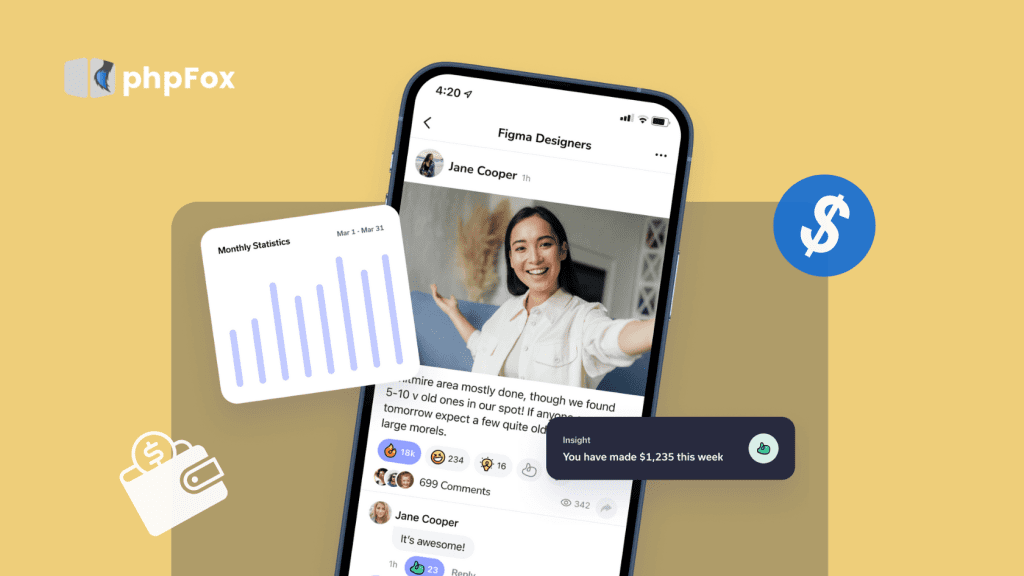
Let’s be real — we all live on our phones. From group chats to playlists, we expect everything to be just a tap away. So why not your community?
Having your own app means your members can engage, learn, shop, and interact with you — anytime, anywhere. No more relying on noisy social media algorithms or hoping your emails get opened. With an app, your brand lives in their pocket, and that’s a game-changer.
Imagine our baking community again. You launch a sleek, branded app where:
- Members can watch your video tutorials on the go

- Buy your ebooks or sign up for your live workshops

- Join exclusive chat groups based on baking styles or experience levels

- Get push notifications when a new event or guide drops

It’s not just about convenience — it’s about creating a premium experience that makes your members feel like VIPs.
And the best part? You can monetize the app using any of the strategies we’ve talked about:
- Sell access to paid content (ebooks, courses)
- Offer in-app purchases or subscriptions
- Promote your products directly
- Host exclusive live events
- Run tiered memberships
All from one, beautifully branded hub.
 Ready to take your community mobile? You bring the passion — we’ll bring the platform.
Ready to take your community mobile? You bring the passion — we’ll bring the platform.
Conclusion
Your online community is more than just a digital gathering — it’s a living, breathing ecosystem full of people who trust you, share your interests, and are ready to grow with you.
The beauty of all the monetization strategies we’ve covered is that they’re built on value, not pressure. Whether it’s a downloadable ebook, a members-only workshop, or a branded mobile app, each method lets you serve your audience while building a business you’re proud of. And remember — you don’t have to do it all at once. Start with one approach, test the waters, and grow from there.
Let us help you build a powerful community where all of these monetization strategies come together in one place — beautifully branded, easy to use, and 100% yours.

phpFox Q1 2025 App Release: Unleashing Powerful New App 31 Mar 11:50 PM (27 days ago)
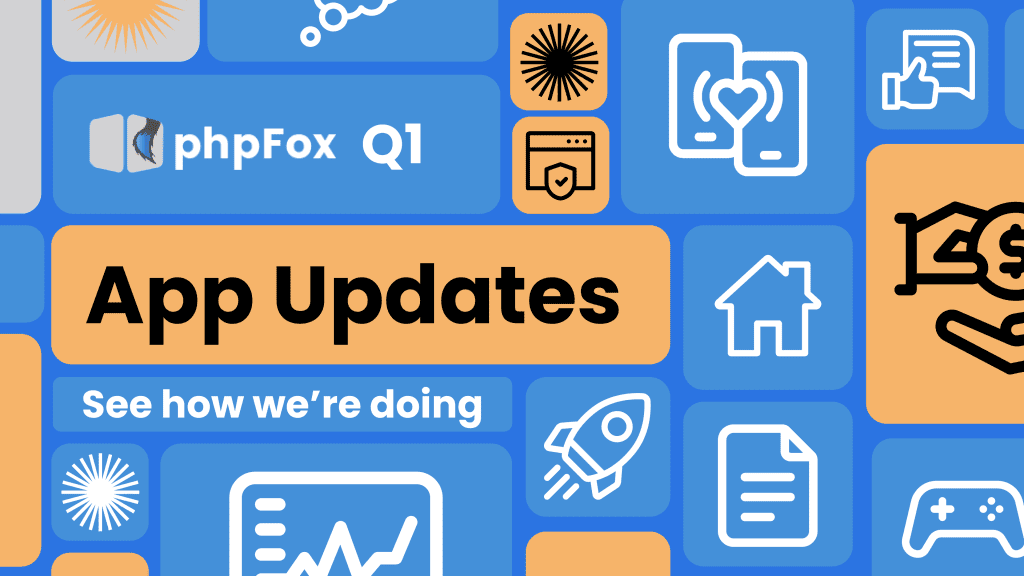
Welcome back to our Quarterly phpFox Apps Updates series! As we step into Q1 2025, we’re excited to introduce a fresh lineup of powerful new apps designed to enhance your phpFox platform.
In this blog, we’ll highlight the latest app releases, giving you a quick overview of what’s new and how these updates can benefit your phpFox community. Whether you’re looking to boost engagement, streamline monetization, or add unique features, we’ve got something for you. Let’s dive into the latest additions to the phpFox Store!
PhpFox
Getting Started
The getting started process is built for simplicity, speed, and scalability, designed to provide a seamless onboarding experience.

Key Features:
- Interactive Walkthrough:
First-time users are greeted with a quick tour of key app features like navigation menus, settings, and messaging tools. - Localized and Accessible:
The onboarding process supports multiple languages and accessibility features like screen readers and larger fonts for an inclusive experience. Support multiple languages to help members who live in many countries. - First-Time Checklist:
Show first-time members a list of what should be done after signing up. A dynamic checklist motivates users to complete tasks like adding photos or enabling location services. - Effortless Navigation Setup:
A walkthrough of menus and shortcuts ensures users quickly understand the app’s structure. - Progress Indicators:
Users can track how far along they are in the onboarding process, reducing uncertainties. - Control and Access: Allow Admin to manage To-do List in Admin Control Panel.
NOWPayments – Payment Gateway
NOWPayments is a cutting-edge cryptocurrency payment gateway that integrates effortlessly with MetaFox, enabling businesses and users to accept a wide range of cryptocurrencies with ease.

Key Features:
- Multi-Crypto Support – Accept payments in various cryptocurrencies with automatic conversion.
- Low Fees & Fast Transactions – Enjoy quick, cost-effective global transactions.
- Flexible & Decentralized Payments – Offer customers more freedom in their payment choices.
YouNet Social
Social Dating
Find your perfect match effortlessly. Social Dating app uses your preferences to deliver tailored connections, making meaningful relationships a click away.

Key Features:
User Verification
- Profile linked to Metafox, minimizing fake accounts
Chat Features
- Built-in text messaging within the app.
- Basic text chat with GIF support, photo and attachment sharing.
Dating Goals
- Allows users to specify their intentions (e.g., casual, serious relationship)
Profile Customization
- Limited customization, with some personality questions
- Multiple photos and short bios
Safety Features
- Block/report features, and private messaging only after mutual interest
Paid Features
- Free to use, no monetized features
Document App
Documents app is a powerful and flexible solution for organizing, managing, and sharing files effortlessly. Designed for seamless collaboration, it integrates with Groups and Pages, making teamwork more efficient. With role-based permissions, real-time interactions, and cross-device access, users can securely manage documents within personal or shared spaces. Whether for teams, communities, or individuals, this app keeps everything organized, accessible, and secure.

Key Features:
- Seamless Integration: Directly share and collaborate on documents within Groups and Pages.
- Advanced Search & Filtering: Quickly locate documents using tags, categories, author, and custom sorting.
- Role-Based Permissions: Control who can view, edit, and manage documents.
- Real-Time Collaboration: Like, comment, and share files with members instantly.
- MyDrive & Shared Spaces: Personal storage plus dedicated drive space for Groups and Pages.
- Privacy & Access Control: Define who can access documents (public, private, community, or friends).
- Approval Workflow: Enable document approvals before sharing within Groups and Pages.
- Cross-Device Access: Manage and access files from both mobile and desktop devices.
Fox App
Property
This powerful plugin integrates a robust Property App into your phpFox website, offering a seamless experience for property sales, rentals, and leases. With features tailored for agents, and owners, and a built-in mortgage calculator, this app is designed to make property management more efficient and user-friendly.

Key Features
- Sale & Lease Listings – Easily list residential or commercial properties with key details like price, amenities, and contact info. Includes high-quality photos and maps for better visualization.
- Location-Based Listings – Boost visibility by targeting specific areas, helping buyers and renters find properties that match their needs.
- Rental Property Listings – Post rental properties with essential details, making it easier for potential tenants to explore and connect.
- Advanced Search: Quickly narrow down your search by selecting specific criteria such as property deal type, property owner type, sort, location, price range, and more.
Vehicle
The vehicle app plugin offers a comprehensive solution for managing vehicle sales and rentals on your phpFox website, with specialized features for agents and owners. The built-in bank EMI calculator enhances the user experience by providing an all-in-one platform for vehicle management, making processes more efficient and user-friendly.

Key Features
- Sell Vehicles – List vehicles with key details like price, features, and contact info. High-quality photos and maps enhance visibility.
- Rent Vehicles – Post rental vehicle listings with comprehensive details, making it easier for renters to find the right match.
- Location-Based Listings – Boost reach by allowing buyers and renters to find vehicles near them, improving convenience and engagement.
Game
This online game plugin offers a unique combination of interactive games, quizzes, and glossaries that can be played and even created by users based on their member level. The plugin supports HTML and HTML5 games, allowing users to upload games from other third-party websites. With a separate admin panel, you can customize and manage settings to suit your needs. This is a great way to stay engaged, learn new things, and have a good time online!

Key Features
- Create Games – Users can create unlimited games, perfect for game series or multiple entries.
- Play Games – Browse and play games instantly without downloads, offering a seamless gaming experience.
- Game URL Integration – Easily add new games by pasting the HTML game URL from external sites.
- Game Categories – Organize games into different categories to enhance user engagement and creativity.
- Advanced Search Filter – Find games effortlessly using filters like genre, popularity, and release date.
Thought
Thoughts is an interactive app that lets users share personal insights, reflections, and inspirations. With categories, tags, and image integration, it creates a dynamic space for meaningful expression and engagement within your community.

Key Features
- Thought Content – Share personal insights or famous quotes for reflection and inspiration.
- Source Attribution – Credit original authors, books, or media for enhanced credibility.
- Categories – Organize thoughts by themes for easy discovery and navigation.
- Tags – Improve searchability by tagging thoughts with relevant keywords.
- Photo Integration – Add images to thoughts for a more engaging and impactful experience.
Testimonial Showcase
The testimonial showcase plugin is a versatile tool that allows admins to display customer feedback, reviews, or endorsements in an appealing and organized manner.

Key Features:
- Mobile Responsive – Fully optimized for seamless display on any device.
- Unlimited Testimonials – Easily create, manage, and showcase multiple customer testimonials.
- Attractive Designs – Choose from five unique display styles to creatively present testimonials.
- Star Rating System – Allow users to rate and review with a 5-star system to build trust and credibility.
Monetize Wishes
Introducing the Wishes App: a powerful tool to boost engagement and revenue on your platform through personalized wish-sharing. Users can create, share, and track their wishes, while admins gain control over pricing, invoicing, and wish management.

Key Features
- Ultimate Wish Management System
- Easily create, categorize, and share wishes.
- Attach photos for better wish presentation.
- Tagging system for easy searchability.
- Mobile-responsive design for all devices.
- Monetization Features
- Admin Pricing Control: Set prices and limit wish shares.
- Free & Paid Wishes: Choose between free or paid wishes.
- User Payments: Pay before sending wishes.
- E-Wallet & Gateways: Integrated with MetaFox’s standard gateways and e-wallet.
- Invoices & Purchase Tracking
- Admin Invoice Management: View all purchase invoices.
- User Purchase History: Track purchases under “My Wishes.”
- Invoice Details: See shared wish count and remaining shares.
- Enhanced Social Interaction
- Send personalized wishes to friends with profile visibility.
- Track received wishes in a dedicated section with notifications.
That’s all for now. We hope that you enjoy the update!
Please continue sending us your feedback on Apps you would like to see in our future updates by writing to hello@phpfox.com or creating tickets in the Client Area. If you want to learn more about the functions and features of these new products, you can contact directly to our third-party vendors directly for inquiries.
And, please stay tuned. We will get back soon.
Community-Based Marketing: A better way to build a brand 17 Mar 1:04 AM (last month)
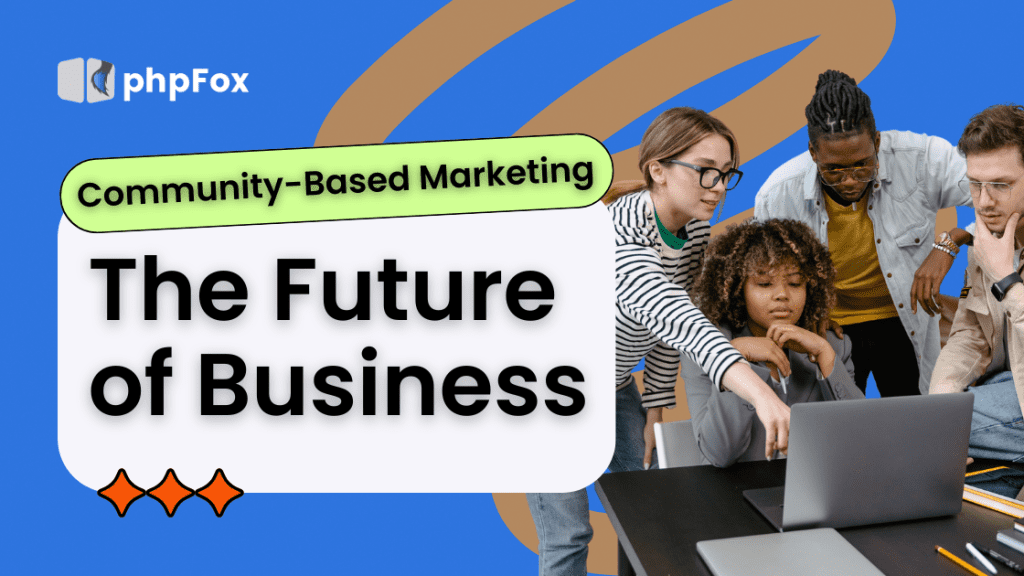
Marketing isn’t what it used to be. Gone are the days when brands could just blast ads and expect people to buy. Consumers are smarter, more selective, and value authenticity more than ever. So, what’s the secret sauce to building a brand in today’s digital world? Community-Based Marketing!
Think of it as moving beyond selling a product or service—it’s about creating a space where people genuinely want to connect with your brand and each other. Sounds exciting? Let’s dive into why this approach works and how you can build a thriving brand community with phpFox.
Table of Contents
1. What is Community-Based Marketing?
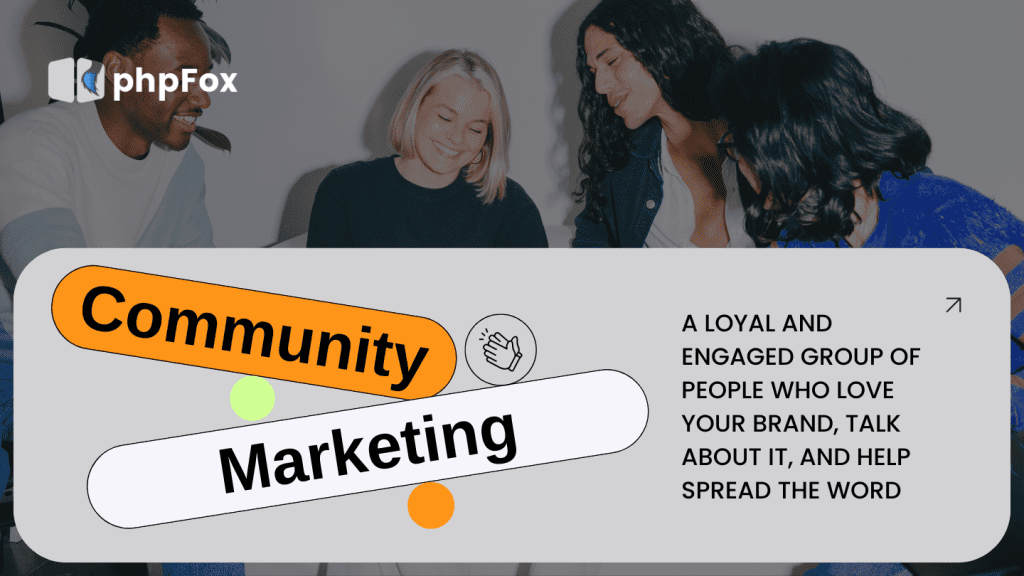
Community-based marketing is all about creating a loyal and engaged group of people who love your brand, talk about it, and help spread the word. Instead of traditional one-way advertising, it focuses on authentic engagement, real conversations, and shared experiences.
Rather than just promoting your product, you create a community where customers feel valued and heard. Whether it’s through social media groups, online forums, or exclusive memberships, the idea is to turn your audience into brand advocates who stick around for the long haul.
2. Why Community-Based Marketing is the Future
Why should you invest in community-based marketing? Here’s why:
Trust & Authenticity: In an age where consumers are bombarded with ads, authenticity stands out. People trust recommendations from their peers far more than traditional advertising. A thriving community builds social proof, as real users share their experiences, reviews, and stories—making your brand more credible and relatable.
Stronger Customer Loyalty: Loyalty isn’t just about offering discounts or rewards; it’s about emotional connection. When customers feel like they’re part of something bigger—a movement, a culture, or a mission—they’re more likely to stay engaged, advocate for your brand, and keep coming back. A well-nurtured community creates long-term brand ambassadors who genuinely believe in your vision.
Organic Brand Growth: Community members naturally become brand advocates, spreading the word through user-generated content, discussions, and recommendations. This word-of-mouth marketing is more powerful than paid advertising, as it feels personal and trustworthy. As a result, your brand gains visibility without relying solely on expensive ad campaigns.
Better Feedback & Innovation: A community is more than just a group of customers; it’s a goldmine of insights. Engaged members provide direct and honest feedback about your products, helping you refine and innovate based on real user needs. Instead of guessing what your audience wants, you get clear signals from the people who matter most—your customers.
Scalability and Long-Term Value: Unlike short-term marketing tactics that require constant reinvestment, a strong community is a long-term asset. As your community grows, so does its impact. Members continuously generate content, attract new users, and keep engagement levels high, creating a self-sustaining ecosystem. This scalable approach ensures lasting brand value and positions your business for sustainable growth in an ever-changing market.
3. Key Elements of a Successful Community-Based Marketing Strategy
So, how do you build a successful brand community? Here are the must-have ingredients:
1⃣ Authentic Engagement
Don’t just talk at your audience—talk with them! Encourage real conversations, respond to comments, and create content that sparks interaction.
2⃣ User-Generated Content (UGC)
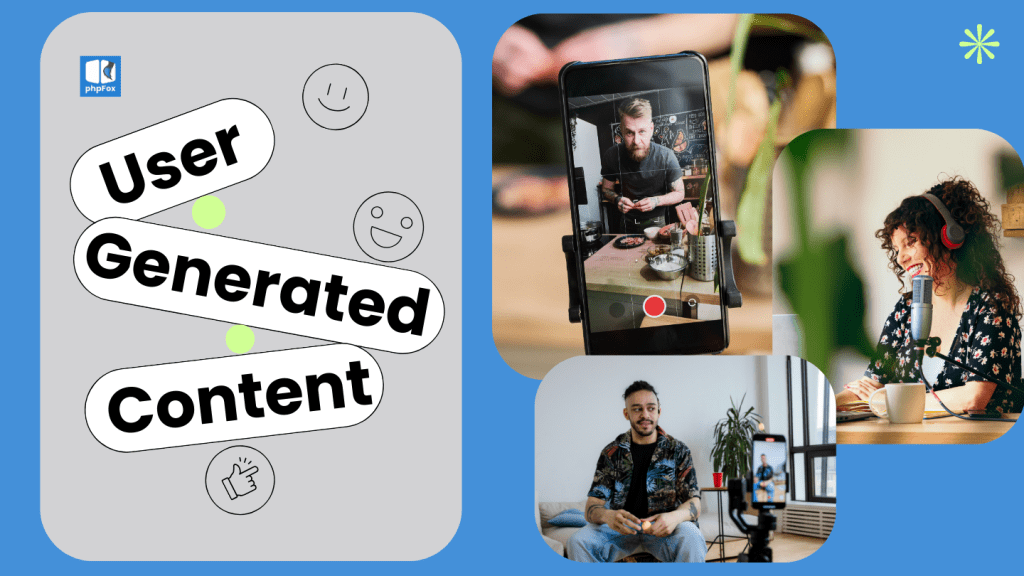
Let your customers be your storytellers! Share their reviews, testimonials, and creative posts featuring your brand.
3⃣ Exclusive Value
Give your community a reason to stay. Offer perks like early access, special discounts, or invite-only events.
4⃣ Choosing the Right Platform
Where does your audience hang out? Whether it’s Facebook Groups, TikTok, Discord, or a dedicated platform like phpFox, pick a place where they feel comfortable engaging.
4. Brands That Successfully Built a Community-Based Approach
Looking for inspiration? Check out these brands that nailed community marketing:
- Nike (Nike Run Club & Training Club) – Building a Lifestyle Ecosystem
Nike didn’t just sell shoes; they built a lifestyle. Their communities, centered around fitness challenges and expert guidance, foster a sense of belonging and shared purpose.
Marketing Takeaway: Brands should aim to create communities around shared values and interests, not just products. This cultivates deeper engagement and turns customers into brand evangelists. - LEGO (LEGO Ideas & Online Community) – Fans get to suggest and vote on new LEGO sets, making them part of the brand’s creative process.
LEGO transformed its audience from passive consumers to active collaborators. By empowering fans to suggest and vote on new products, LEGO tapped into a wealth of creative potential and fostered a sense of ownership.
Marketing Takeaway: Involve your audience in the creative process. Co-creation generates innovative ideas and builds a strong sense of community and brand loyalty. - Glossier (Customer-Led Marketing) – Grew from a beauty blog into a powerhouse brand by listening to and co-creating with their audience.
Glossier’s meteoric rise is a testament to the power of listening. They built their brand by actively engaging with their audience, incorporating feedback into product development, and fostering a sense of community.
Marketing Takeaway: Prioritize customer feedback and build a culture of listening. This allows you to create products and experiences that resonate with your audience, fostering genuine brand advocacy. - Red Bull (Extreme Sports Community) – Focuses less on selling energy drinks and more on adrenaline-fueled experiences and content.
Red Bull’s strategy transcends traditional product marketing. They built a powerful community around extreme sports and adrenaline-fueled content, creating a lifestyle brand that resonates with their target audience.
Marketing Takeaway: Content can be a powerful tool for building communities. Focus on creating valuable, engaging content that aligns with your brand’s values and your audience’s interests.
5. How phpFox Empowers Brands with Community-Based Marketing
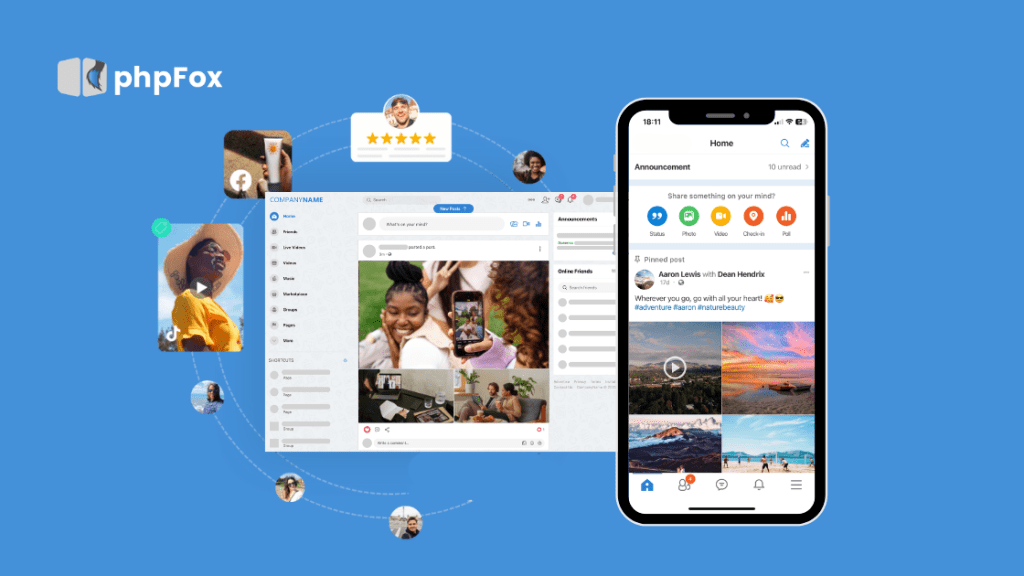
See how phpFox helps brands grow stronger by building their own online communities. Let’s turn your biggest fans into your best marketers and let real conversations drive your brand’s success.
- All-in-One Platform – Create and manage your own branded community with ease.
- Engagement Tools – Features like forums, live streaming, and discussion groups keep your audience actively participating.
- Monetization Opportunities – Generate revenue through subscriptions, memberships, and sponsored content.
- Mobile app: grow and manage your community anytime, anywhere
6. Steps to Get Started with phpFox
Ready to build a brand community? Here’s how you can start:
1⃣ Define Your Community’s Purpose – What problem are you solving? Who is your target audience?
2⃣ Set Up Your phpFox Platform – Customize your community space with features that encourage interaction.
3⃣ Attract & Engage Members – Use content, events, and discussions to bring people in and keep them hooked.
4⃣ Measure & Optimize – Track engagement, gather feedback, and refine your strategy for continuous growth.
Conclusion
Community-based marketing isn’t just a trend—it’s the future. Brands that build strong, engaged communities stand out, grow organically, and create lasting customer relationships. With phpFox, you can easily create a community that not only supports your brand but also helps it thrive.
Ready to take your brand to the next level? Start your community with phpFox today! 
It’s your lucky day! St. Patrick’s Day sale 9 Mar 7:43 PM (last month)

 Get Lucky with Our St. Patrick’s Day Deals!
Get Lucky with Our St. Patrick’s Day Deals! 
St. Patrick’s Day is here—a time for luck, growth, and new opportunities! To celebrate, we’re offering exclusive discounts to help you build and expand your online community. Don’t miss out on these golden deals—grab yours before they’re gone! 

Sale Details
 Sale Duration: March 12th, 2025, at 9:00 AM PST until March 21st, 2025, at 11:59 PM PST.
Sale Duration: March 12th, 2025, at 9:00 AM PST until March 21st, 2025, at 11:59 PM PST.
 What’s inside your lucky envelope?
What’s inside your lucky envelope?
1. phpFox License + Premium App Bundle – 20% Off
Unveiling an unbeatable bundle! Avail a remarkable 20% discount on our phpFox License & Premium App Bundle.
This exclusive package features a Pro or Ultimate License combined with our esteemed phpFox Premium Apps: Live Videos, ChatPlus, and Stories.
Note: This bundle is accessible for purchase exclusively under the Promotion section of the Client Area. Ensure registration before purchase.
CODE: LUCKY20
2. phpFox Premium App Bundle – 20% Off
Elevate your community platform with our phpFox Premium App Bundle, now available at an impressive 20% discount!
This bundle encompasses all three Premium phpFox Apps: Live Videos, ChatPlus, and Stories.
Note: This bundle is exclusively for those already holding MetaFox licenses, accessible for purchase under Product Addons of the Client Area. You will need to log in before purchasing.
CODE: LUCKY20
3. Purchase of individual phpFox License, Subscription, or Apps – 15% Off
Enjoy a generous 15% discount on any individual Licenses or Apps – applicable to License & Subscription purchases, phpFox Apps
Directly acquire from our Website, Appstore, or Client Area.
CODE: LUCKY15
4. Annual Renewals and Upgrade – 15% Off
Get a generous 15% discount on Annual Renewal and Upgrade. Directly acquired from Client Area.
CODE: LUCKY15
 Third-Party Apps Deals
Third-Party Apps Deals
YouNet Social
- All YNS app bundles – 20% discount
This bundle includes all apps: CCBill Payment Gateway, Snow Effect, Business Landing Page, Stripe Payment Gateway, Social Invitations, and Central Theme.
CODE: PATRICK20
2. Individual app purchases – 15% discount
Enjoy a 15% discount on any single app purchase
CODE: PATRICK15
Fox Expert
Get a 20% discount for the best apps for Metafox
CODE: Patrick
 Don’t miss these lucky deals – give your business the boost it deserves before the magic fades!
Don’t miss these lucky deals – give your business the boost it deserves before the magic fades! 

Terms and conditions apply. Promotion is valid within the specified period. Contact us for more details.
On-Premise Social Networks: The Ultimate Choice for Enterprise Success 3 Mar 6:20 PM (last month)

In an era where digital collaboration is crucial, enterprises constantly seek the best way to facilitate internal communication and engagement. Enterprise social networks have become essential tools for fostering collaboration, knowledge sharing, and employee engagement. As organizations navigate their digital transformation journeys, a critical decision emerges: should they implement a cloud-based SaaS solution or an On-Premise Social Network?
While both options offer compelling benefits, On-Premise Social Network has emerged as the preferred choice for many large enterprises, particularly those in regulated industries or with strict security requirements. Let’s explore why On-Premise Social Network is winning the enterprise battle and clarify the key differences between these two models.
Table of Contents
1. Understanding the Difference Between SaaS and On-Premise Social Network
When evaluating SaaS vs On-Premise Social Network, it’s essential to weigh these advantages and disadvantages carefully against your organization’s specific requirements. Understanding these software delivery methods will empower decision-makers to choose the best deployment model that aligns with their operational goals while considering factors like budget constraints, security needs, and long-term scalability plans.
At its core, the distinction lies in how enterprise software is delivered and managed.
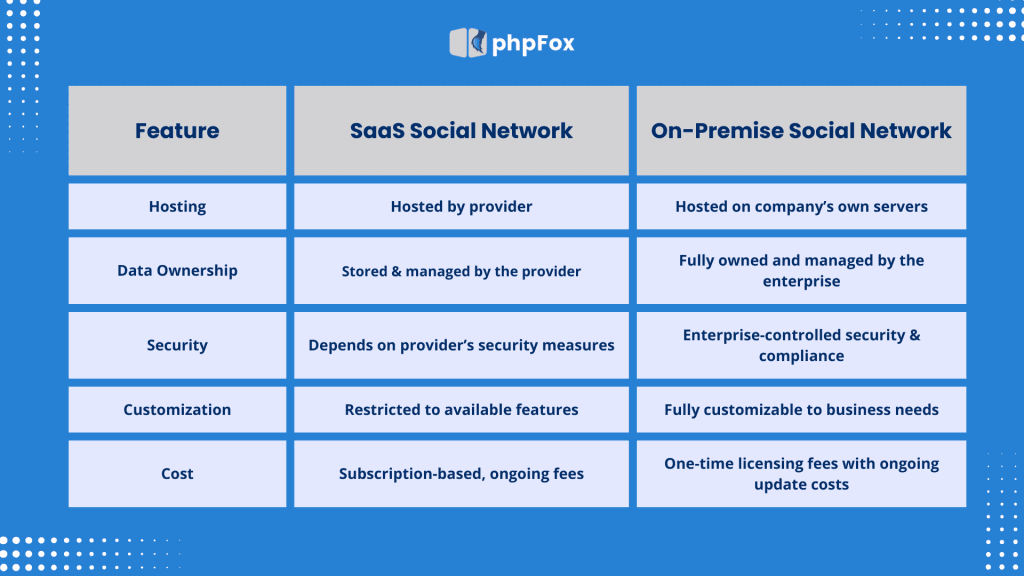
What is a SaaS?
A Software-as-a-Service (SaaS) social network is delivered through the cloud by a third-party provider. These solutions are typically subscription-based, with data and security managed externally. The vendor handles all infrastructure, maintenance, and updates, while the enterprise accesses the platform through web browsers or dedicated apps.
Key characteristics include:
- Cloud-based infrastructure managed by the provider
- Subscription-based pricing model
- Provider-managed security and compliance
- Automatic updates and feature rollouts
While they offer convenience and lower upfront costs, they come with limitations in terms of data ownership, customization, and control over security policies. Common examples of SaaS include social platforms like Circle, Teachable, Kajabi
Pros of SaaS Social Networks:
- Lower Upfront Investment: Minimal initial capital expenditure with subscription-based pricing models spreading costs over time.
- Rapid Deployment: Quick implementation without the need to configure and maintain hardware infrastructure.
- Automatic Updates: Continuous feature improvements and security patches without IT intervention.
- Reduced IT Burden: Provider-managed infrastructure eliminates need for specialized in-house expertise for maintenance.
- Accessibility: Universal access from any location with internet connectivity.
- Predictable Expenses: The subscription model provides clear visibility into ongoing costs.
Cons of SaaS Social Networks:
- Limited Data Control: Organizations surrender full ownership and physical control of their data.
- Security Concerns: Reliance on provider’s security protocols which may not align with specific organizational requirements.
- Customization Limitations: Typically offer less flexibility for deep customization compared to on-premise solutions.
- Ongoing Costs: Subscription fees continue indefinitely and may increase over time, potentially exceeding on-premise costs in the long run.
- Compliance Challenges: May present difficulties for organizations in highly regulated industries with strict data sovereignty requirements.
- Vendor Lock-in: Potential challenges in migrating data if changing providers becomes necessary.
What is an On-premise?
An on-premise enterprise social network is a collaboration platform that is installed and runs on the company’s own servers and infrastructure. The organization maintains complete control over the hardware, software, and data within their own data centers or private cloud environments.
Key characteristics include:
- Physical infrastructure owned or leased by the enterprise
- Software installed on company-controlled servers
- Direct management of security protocols and access controls
- Complete data sovereignty within organizational boundaries
- One-time licensing fees with ongoing maintenance costs
Examples include customized installations of platforms like Jive, Microsoft SharePoint (self-hosted), or platforms like phpFox.
Pros of On-Premise Social Network:
- Complete Data Control: Organizations maintain full ownership and physical control over all data, keeping sensitive information within company boundaries.
- Enhanced Security: Ability to implement customized security protocols that align precisely with specific organizational requirements and industry regulations.
- Compliance Advantages: Easier to meet strict regulatory requirements in heavily regulated industries like healthcare, finance, and government.
- Customization Flexibility: Unlimited ability to modify features, interfaces, and workflows to match exact business processes and requirements.
- Long-term Cost Benefits: While requiring higher initial investment, can be more economical over time for large enterprises by eliminating perpetual subscription fees.
- Integration Capabilities: Deeper integration possibilities with existing legacy systems and proprietary technologies through direct database connections.
- Control Over Updates: Organizations decide when and how to implement updates, preventing disruption during critical business periods.
Cons of On-Premise Social Networks:
- Higher Initial Investment: Significant upfront capital expenditure for hardware, software licensing, and implementation.
- Slower Implementation: Typically requires longer deployment timelines compared to ready-to-use SaaS solutions.
- Maintenance Responsibility: The organization bears full responsibility for updates, patches, and system reliability.
- Physical Infrastructure Vulnerabilities: Requires disaster recovery planning and physical security protocols to protect on-site servers.

Why On-Premise Social Network Remains the Top Choice for Enterprises
1. The Importance of Data Security in Corporate Environments
For enterprises managing sensitive data like Financial and banking institutions, Healthcare providers, Government – maintaining absolute control over its storage and processing is a must. The on-premise model empowers these organizations to implement precise compliance controls and provide regulators with comprehensive insights into data handling practices—capabilities that can be limited with SaaS solutions, where providers often dictate terms.
On-premise On-Premise Enterprise Social Network offers a level of data control that translates directly to enhanced security and compliance:
- No data sharing with outside companies: With on-premise systems, your sensitive information never leaves your buildings. This eliminates all the risks that come with letting third parties handle your data.
- Custom security measures: Your security team can set up specific protections that fit your company’s unique needs—from special encryption to network security measures that just aren’t possible with standard cloud offerings.
- Meeting regulations your way: For companies working across different countries with laws like GDPR or CCPA, on-premise systems let you control exactly where data is stored and how it’s processed.
- Better protection against insider threats: On-premise systems make it easier to watch for unusual access patterns and potential data theft by connecting directly with your existing security systems.
2. Full Control Over Customization
One of the biggest advantages of an on-premise enterprise social network is the ability to customize it according to specific business needs. Enterprises can tailor workflows, user interfaces, integrations, and feature sets without being limited by the constraints of a SaaS provider. This level of flexibility ensures that the platform aligns perfectly with corporate objectives and operational workflows.
- Systems that match how you work: Every company has its own unique communication styles and approval processes. On-premise systems can be changed at the code level to match your specific workflows instead of forcing your company to adapt to standardized templates.
- Branding that reflects your culture: Deep customization means your social network becomes a natural extension of your company culture, going well beyond just logos and colors.
- Features that support your goals: Development resources can focus on capabilities that drive your specific business outcomes rather than accepting generic features designed to please the widest possible audience.
- Working with older systems: For companies with significant investments in specialized older systems, on-premise networks can be customized to work with these systems rather than forcing expensive upgrades.
This flexibility allows enterprises to create social networking environments that feel like natural extensions of their organization rather than generic platforms.
3. Seamless Integration with Existing Enterprise Systems
Most large organizations rely on multiple software solutions for HR, CRM, ERP, and project management. An on-premise social network integrates seamlessly with these systems, enabling smooth data exchange and a unified digital ecosystem. Unlike SaaS solutions with limited integration options, on-premise platforms provide advanced API and database access for greater flexibility.
On-premise ESNs maximize existing technology investments by offering deeper integration through direct database connections, custom APIs, and specialized connectors—capabilities often restricted in SaaS environments.
phpFox, powered by the MetaFox Framework, leverages a REST API architecture for seamless third-party integrations—CRM, payments, analytics, and more.
Explore MetaFox Framework
4. Cost-Effectiveness in the Long Run
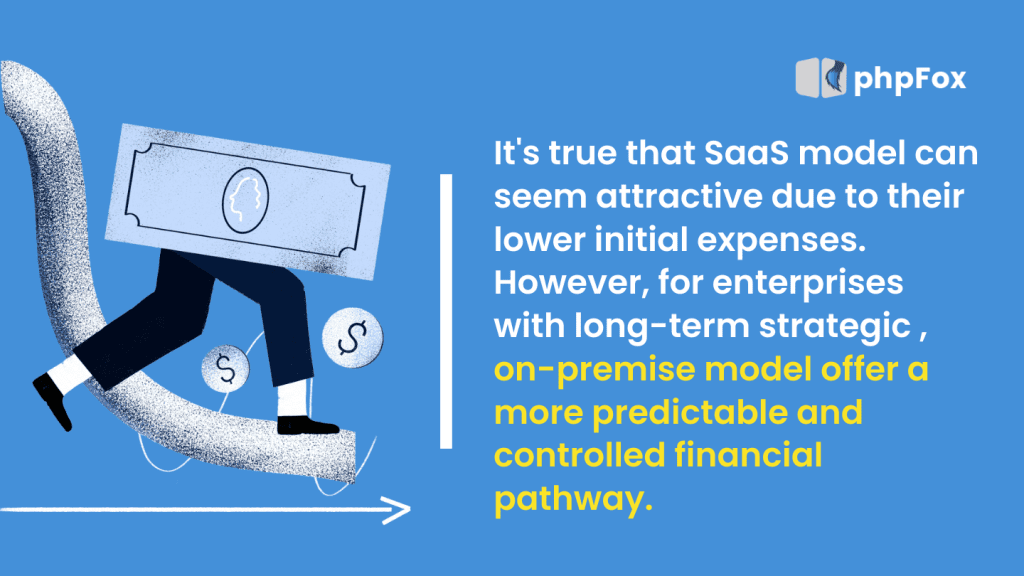
The financial benefits of on-premise social networks become clear when you look at the total cost over time, not just the initial price. While SaaS solutions typically have lower upfront costs, on-premise solutions can be more cost-effective in the long run for enterprises:
- No ongoing subscription fees: While cloud solutions create permanent monthly expenses that typically increase over time, on-premise systems can be purchased once and maintained at a predictable cost.
- Using existing equipment: Companies can use their existing servers, specialized hardware, and in-house expertise to achieve performance levels that would require expensive cloud subscriptions.
- Saving on data transfer costs: For organizations that share a lot of videos and large files, eliminating external data transfer costs can mean huge savings.
- Building value through ownership: Unlike cloud subscriptions where spending creates no lasting asset, investments in on-premise systems build company value through owned software, customizations, and internal expertise.
- Independence from vendor changes: Perhaps most importantly, on-premise systems protect companies from unexpected price increases, feature removals, and strategy changes that cloud providers routinely make.
Making the Strategic Choice
While SaaS social networks offer advantages in rapid deployment and reduced IT overhead, on-premise solutions continue to dominate enterprises where security, compliance, integration, and customization are paramount concerns.
The ideal approach depends on your organization’s specific requirements and constraints:
- Consider an on-premise ESN if: You operate in a heavily regulated industry, have substantial legacy system integration needs, require extensive customization, or have long-term cost optimization as a priority.
- Consider a SaaS solution if: Rapid deployment, minimal IT overhead, and automatic updates outweigh concerns about data control, customization limitations, and long-term subscription costs.
Conclusion: Making the Case for On-Premise Enterprise Social Networks in a Digital Age
While SaaS enterprise social networks offer convenience and quick deployment, they come with trade-offs in security, customization, and long-term costs. For enterprises that require full control over their data, seamless system integration, and robust security measures, an on-premise enterprise social network is the superior choice.
By investing in an on-premise solution, enterprises can ensure that their internal collaboration platform is secure, scalable, and perfectly tailored to their unique business needs. As organizations continue to prioritize data sovereignty and regulatory compliance, on-premise social networks will remain the preferred choice for enterprises aiming for long-term success.
Membership Site Platforms: The Ultimate Guide to Building and Growing Your Online Community in 2025 24 Feb 6:03 PM (2 months ago)
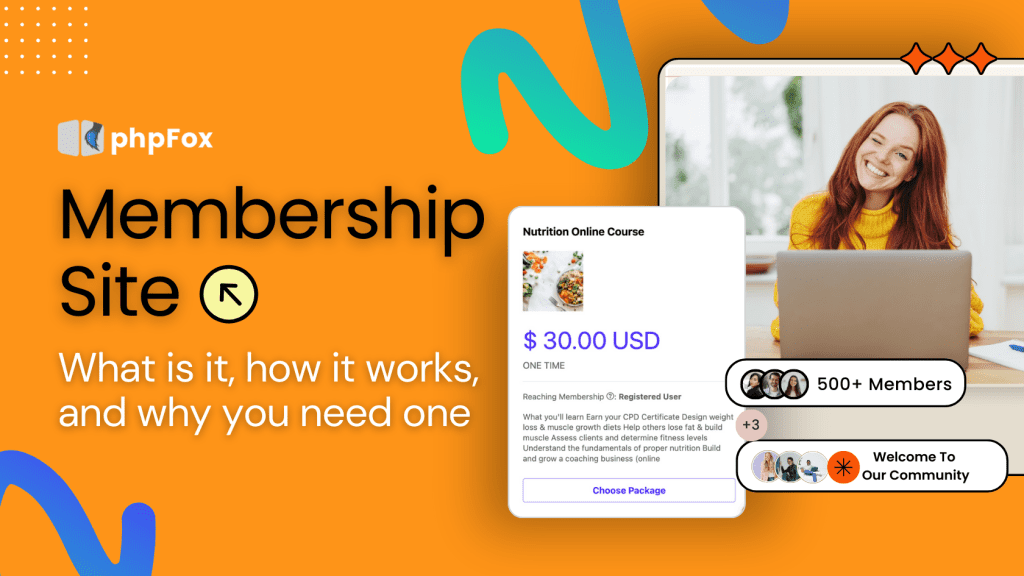
Building an online community and want to turn it into a real revenue stream? Then you need the right tools—starting with a powerful membership site platform. It’s the foundation of any successful online business, whether you’re a course creator, consultant, or community leader. The right platform helps you grow and keep your members engaged, while the wrong one can make it hard to attract and retain people. And with the market booming, now’s the perfect time to get started.
In this guide, we’ll break down what a membership site is, its key benefits, and how to choose the best platform for your needs. Let’s dive in!
Table of Contents
1. What Are Membership Site Platforms?
Membership site platforms are online systems that allow businesses, creators, and organizations to offer exclusive content, services, or products to a subscribed audience.
Users pay a fee—either one-time or recurring—to access gated content, participate in discussions, or receive premium benefits.
Pat Flynn’s approach to memberships offers a great example. He’s a well-known figure in the online business world, particularly for his focus on passive income and community building, and has built a thriving empire through his Smart Passive Income brand, with membership sites playing a crucial role in his strategy. He prioritizes community, provides exceptional value, and constantly adapts to the needs of his audience.
2. Membership Site Platforms vs Traditional Websites: Key Differences That Matters
Before you commit, it’s crucial to understand the fundamental differences between membership platforms and traditional websites. This comprehensive breakdown will explore their unique characteristics, and diverse applications, and help you determine which platform is the perfect fit for your content, audience, and long-term goals.
Let’s break down the fundamental differences between membership platforms and traditional websites to help you understand their unique characteristics and use cases.
Content Access:
- Regular Websites/Blogs: Content is generally open and accessible to anyone. Think of a news site, a company’s “About Us” page, or a blog with free articles.
- Membership Site Platforms: Content is gated behind a “membership wall.” Only paying members (or those with a specific level of access) can see it. This could be anything: exclusive articles, videos, courses, downloads, community forums, etc.
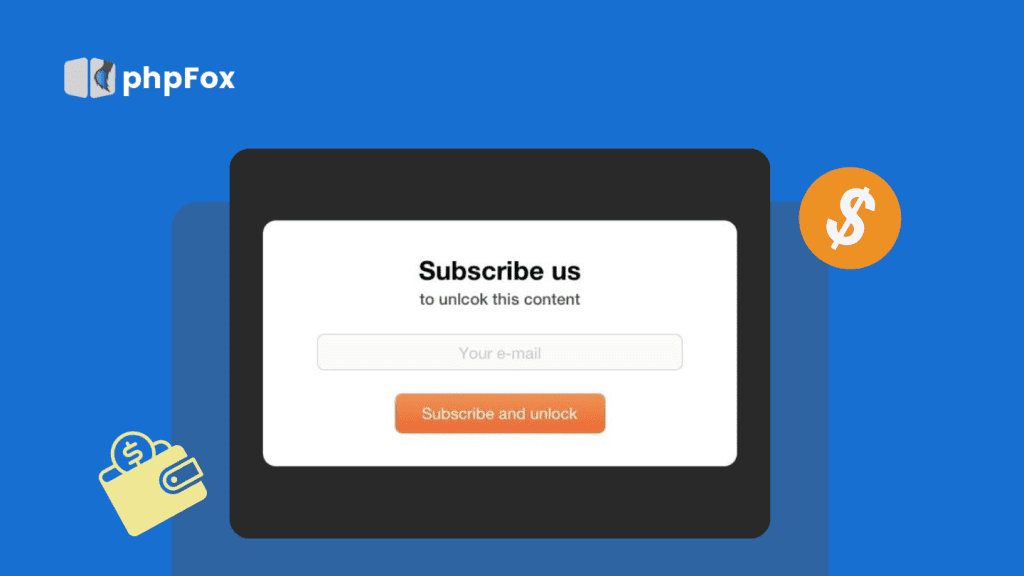
2. Community Focus:
- Regular Websites/Blogs: While some may have comment sections, the focus is primarily on broadcasting information outward. Interaction is often limited.
- Membership Site Platforms: These are designed to foster a sense of community. Members can interact with each other, the site owner, and build relationships through forums, groups, direct messaging, and events.
3. Monetization Model:
- Regular Websites/Blogs: Revenue often comes from ads, affiliate marketing, or selling products/services separately from the content itself.
- Membership Site Platforms: The core business model is recurring revenue from membership subscriptions. Members pay for access to the exclusive content and community.
4. User Experience:
- Regular Websites/Blogs: The experience is often more passive – reading, browsing, etc.
- Membership Site Platforms: The experience is designed to be more active and participatory. Members are encouraged to engage, contribute, and connect.
In a nutshell, think of it like this:
- Regular website/blog: Like a free magazine stand. Anyone can come and read.
- Membership site platform: Like a private club. You pay a fee to get in and enjoy the exclusive benefits.
If you want to build a loyal community, offer exclusive value, and generate recurring income, a membership site platform is the way to go. It provides the structure and tools to make it happen.
3. Common Membership Models
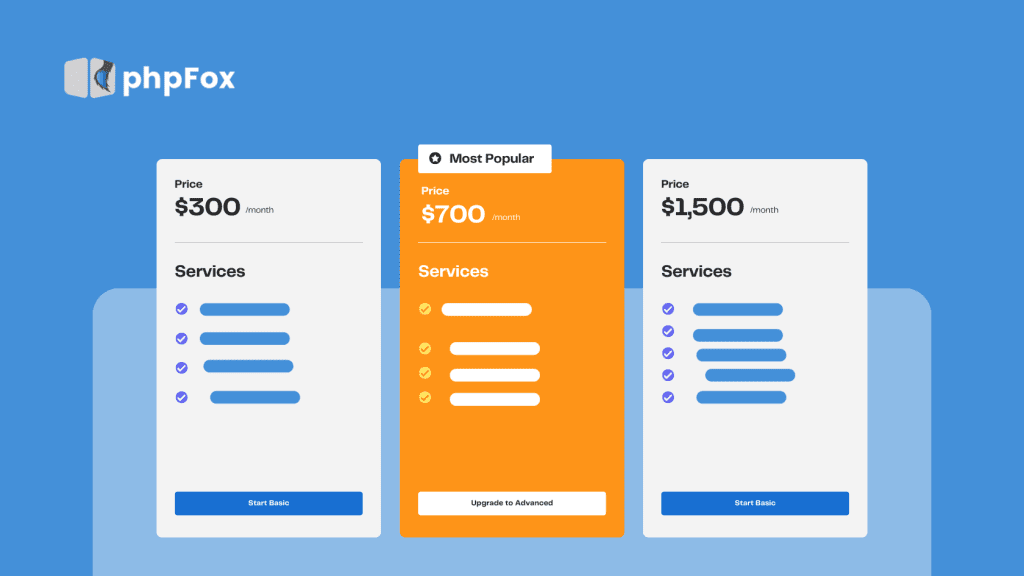
There’s no one-size-fits-all approach to membership sites. The model you choose should align with your content strategy, audience preferences, and business goals. Here are some of the most common membership models:
1. Subscription-Based Membership
This model allows users to pay a recurring fee—whether it’s monthly, quarterly, or annually—in exchange for continuous access to exclusive content, premium features, or specialized services. It provides a steady revenue stream for businesses while ensuring that members stay engaged over time.
 Example: Online learning platforms like MasterClass and Skillshare operate on a subscription model, granting users unlimited access to a vast library of courses taught by industry experts. Whether it’s learning filmmaking from Martin Scorsese or diving into graphic design, subscribers can explore content at their own pace.
Example: Online learning platforms like MasterClass and Skillshare operate on a subscription model, granting users unlimited access to a vast library of courses taught by industry experts. Whether it’s learning filmmaking from Martin Scorsese or diving into graphic design, subscribers can explore content at their own pace.
2. One-Time Payment Membership
With this model, users make a single upfront payment to gain lifetime access to a specific course, resource library, or exclusive content. This approach is ideal for businesses that want to provide long-term value without requiring recurring payments. It’s also attractive to customers who prefer a one-time investment over ongoing subscriptions.
 Example: Digital products like e-books, online courses, or exclusive webinar recordings often follow this model. Once purchased, users can revisit the material anytime, making it a great option for self-paced learning or on-demand resources.
Example: Digital products like e-books, online courses, or exclusive webinar recordings often follow this model. Once purchased, users can revisit the material anytime, making it a great option for self-paced learning or on-demand resources.
3. Tiered Membership
This model offers multiple pricing levels, each unlocking different levels of access, or exclusive content. It allows businesses to cater to a wider audience by providing both basic and premium experiences. Higher tiers often come with added benefits such as early access, bonus materials, or personalized interactions.
 Example: Patreon follows this structure, where creators offer different membership tiers. A basic tier might grant access to behind-the-scenes content, while higher tiers could include exclusive videos, live Q&A sessions, or personalized shoutouts, giving supporters more ways to engage.
Example: Patreon follows this structure, where creators offer different membership tiers. A basic tier might grant access to behind-the-scenes content, while higher tiers could include exclusive videos, live Q&A sessions, or personalized shoutouts, giving supporters more ways to engage.
4. Community-Based Membership
This model focuses on providing exclusive access to a private community, forum, or mastermind group where members can connect, share insights, and learn from like-minded peers. It’s ideal for those seeking networking opportunities, mentorship, or a support system within a specific industry or interest group. Businesses benefit by fostering engagement and building a loyal, value-driven community.
 Example: Professional networking communities like LinkedIn Learning Groups allow members to discuss industry trends, share expertise, and gain valuable insights from professionals in their field. Similarly, mastermind groups offer high-level discussions and mentorship opportunities for business leaders and entrepreneurs.
Example: Professional networking communities like LinkedIn Learning Groups allow members to discuss industry trends, share expertise, and gain valuable insights from professionals in their field. Similarly, mastermind groups offer high-level discussions and mentorship opportunities for business leaders and entrepreneurs.
4. Benefits of Membership Site Platforms for Community Owners
A well-built membership site can provide long-term value for both businesses and members. Here’s why they’re a game-changer:
 Steady Revenue Stream :
Steady Revenue Stream :
Subscription-based models generate predictable income, helping businesses scale sustainably.
 Stronger Community & Brand Loyalty
Stronger Community & Brand Loyalty
Exclusive content and interactive features foster deeper connections and brand advocacy.
 Enhanced Customer Experience
Enhanced Customer Experience
Tailored content and engagement features create a more valuable and personalized user journey.
 Better Control Over Content Distribution
Better Control Over Content Distribution
Unlike social media, membership sites give creators complete control over their content and monetization.
 Scalability & Growth Potential
Scalability & Growth Potential
With the right strategy, membership platforms can evolve into larger ecosystems with added offerings like coaching, events, and premium services.
5. Essential Features of Membership Site Platforms
Not all membership site platforms are created equal. The best ones offer essential tools that support both community growth and business scalability. Here’s what to look for:
 Flexible Payment & Subscription Management
Flexible Payment & Subscription Management
Successful membership site platforms should offer multiple payment methods to accommodate different user preferences. Supporting various gateways, recurring billing, and easy subscription upgrades or downgrades ensures a seamless experience for members while maximizing revenue potential for businesses.
phpFox provides flexible payment options by supporting PayPal, Activity Points, Google Pay, and Apple Pay. This allows community owners to offer diverse payment choices, making it easier for users to subscribe, renew, or switch between membership plans without hassle.
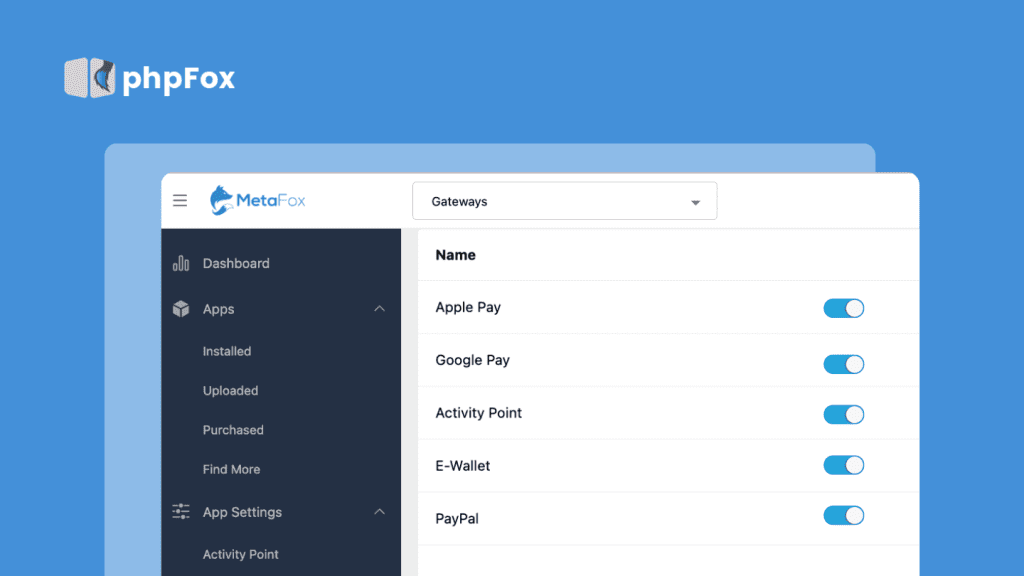
 Content Restriction & Access Control
Content Restriction & Access Control
To create a premium membership experience, your platform should allow you to gate content and set different access levels based on user roles or subscription tiers. This ensures that exclusive content remains available only to paying members while providing a structured way to deliver value at different levels.
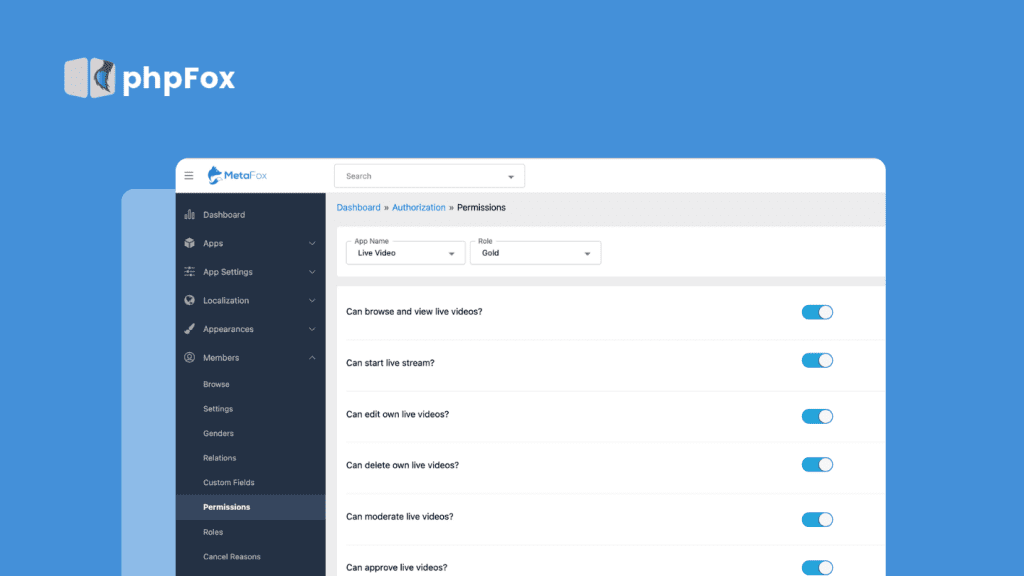
phpFox offers powerful user access control, allowing admins to restrict content based on membership levels. Whether it’s premium articles, private groups, or exclusive videos, site owners can customize access to ensure the right content reaches the right audience.
 Community Engagement Tools
Community Engagement Tools
Building a thriving membership community goes beyond just offering content—it’s about fostering meaningful interactions. Features like forums, live chat, and interactive spaces encourage members to connect, share insights, and actively participate, creating a strong sense of belonging.
Built-in community engagement tools, including forums, live chat, groups, and activity feeds, allow members to interact in real-time, collaborate on discussions, and build lasting connections within the platform.
 Custom Branding & Personalization
Custom Branding & Personalization
A strong brand identity is key. Look for platforms that allow customization to reflect your brand’s personality.
 Mobile Responsiveness
Mobile Responsiveness
With more users accessing content on their mobile devices, having a responsive and mobile-friendly design is no longer optional—it’s essential. A seamless mobile experience ensures that members can engage with your platform anytime, anywhere, without frustration.
phpFox offers a fully responsive design and a dedicated mobile app, allowing users to browse content, participate in discussions, and manage their memberships effortlessly from their smartphones or tablets.
If you’re looking for a powerful membership site platforms to onboard your audience?
You’re in the right place. phpFox offers a comprehensive suite of tools to bring together your members, discussions, events, and content—all under your own brand. Ready to build your thriving community?
Start your free 14 day trial today!
phpFox 5.1.17 Official Release 16 Feb 6:55 PM (2 months ago)
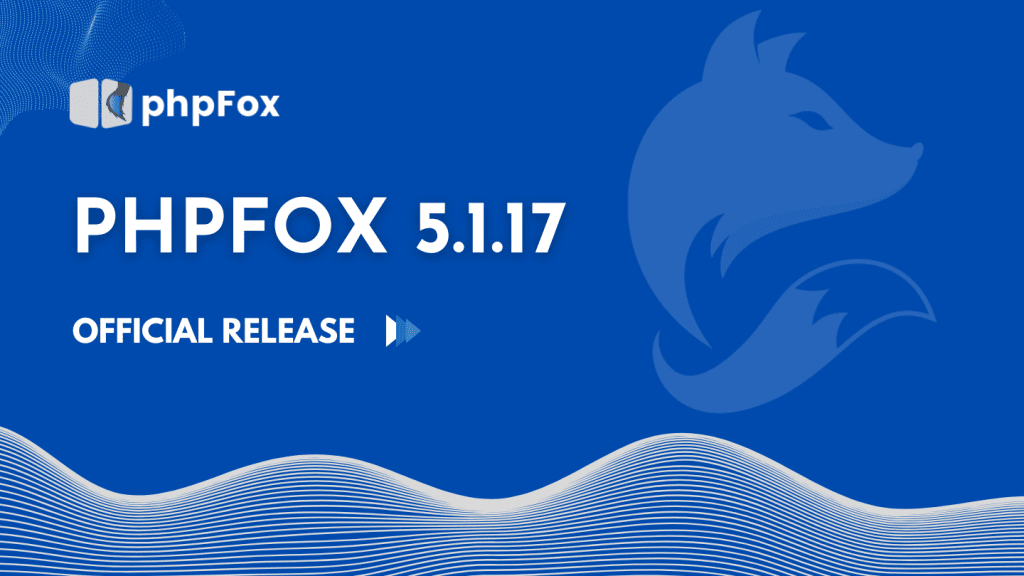
We’re excited to introduce phpFox 5.1.17, packed with new features, enhancements, and improvements to streamline your community management experience. This update brings better AdminCP controls, improved user management, and refined UI/UX for a more intuitive workflow.
Now let’s dive into discovering how MetaFox version 5.1.14 can transform your workflows and streamline your processes.
 What’s new in the release?
What’s new in the release?
1. Core Updates
 AdminCP Improvements
AdminCP Improvements
- Manage Items Page: Admins can now efficiently manage content with a dedicated page for handling items.
- Mass Actions for Items: Bulk approve or delete multiple items in just a few clicks.
- Site Settings – PWA Enhancements: The App Description and Install Description fields now support multiple languages.
- Deny User Notifications: Admins can send notifications via email or SMS when denying a user’s registration.
- CLI Support for Apps: Quickly activate or deactivate apps using CLI commands.
- Security Enhancements: Improved URL handling to prevent conflicts with firewall rules.
 UI/UX Enhancements
UI/UX Enhancements
AdminCP Updates
- Relationships Module: Removed the redundant “Enable Relationships” setting for better clarity.
- App Management:
- Added sortable columns for better organization.
- Introduced an Upgrade All button to update multiple apps at once.
- Added mass actions for activating or deactivating multiple apps.
- Member Management:
- Updated phrasing in the Search form for Inactive Members to improve clarity.
- The Search field now uses “Display Name” instead of generic search text.
- Changed “Any” role label to “All” for better accuracy.
- Data Grids: Now display total item counts on all relevant pages for improved visibility.
2. App Updates
 Group
Group
- Member Requests: Group administrators and moderators can now provide a reason when declining a request to join their group.
- Improved Notifications: Added a hyperlink to the “Accept your request to join the group” notification for easier access.
- Mobile App UI Improvements: Adjusted the Manage Group layout for moderators for better usability.
- Member Permissions: Group admins and moderators can no longer unmute themselves if muted by another admin.
 Feed
Feed
- “Hide All from <User>” Option: Users can now hide all posts from a specific user for a more personalized feed experience.
- Manage Hidden Posts: A new “Manage Hidden” page in Account Settings allows users to review and unhide posts easily.
- Performance Optimization: Improved feed performance by implementing resource caching for faster loading times.
 UI/UX Enhancements
UI/UX Enhancements
- Clearer Video Uploads: Updated the “Video URL” shortcut to avoid confusion with media uploads (photos & videos).
- Mobile App Enhancement: Users can now input text while a link preview is loading, ensuring a smoother posting experience.
- Frontend Web Improvements:
- Enhanced border styling for photos in feed items.
- Adjusted Group post visibility in the news feed by hiding certain group-related actions.
- Bug Fixes: Various bug fixes across the platform to improve stability and functionality.
 Video
Video
- Manage Items Page in AdminCP: Administrators now have a dedicated Manage Items page to oversee and manage videos efficiently.
- Move Videos Between Albums: Users can now reorganize their videos by moving them to different albums when editing.
 UI/UX Enhancements
UI/UX Enhancements
- Enhanced Notifications: Improved layout for “Created a new video” notifications for better readability.
- Video Titles in Composer Posts:
- Enhanced video title display when uploaded via the composer post on the Manage Videos page.
- Title now appears when sharing a video URL in the Feed, ensuring better content clarity.
- Page Info Alignment: Enhanced alignment on the page info section for a polished, uniform appearance across mobile devices.
- Bug Fixes: Various bug fixes and performance optimizations across both web and mobile to ensure smooth functionality.
 Chatplus
Chatplus
- Banned Word Sanitization: Automatically sanitize restricted words in messages to maintain a safer community environment.X Improvements.
 UI/UX Enhancements
UI/UX Enhancements
 Mobile App
Mobile App
- Faster Direct Conversations: Improved speed when opening a one-on-one chat from a group conversation.
 Frontend Web
Frontend Web
- Enhanced Video Playback: Upgraded the video player in conversations for a better viewing experience.
- Refined Action Buttons: Adjusted the positioning of action buttons when hovering over a message containing two photos for improved usability.
- Upgraded Video Call Library: Updated lib-jitsi-meet for better video call performance.
- Bug Fixes: Various bug fixes and performance optimizations for a smoother experience across the platform.
 Live Video
Live Video
- Manage Blogs Page: Added a dedicated Manage Blogs page for better organization.
 UI/UX Enhancements
UI/UX Enhancements
 Mobile App
Mobile App
- Sticker Comments: Improved the layout of sticker comments on live videos for better visibility.
- Go Live Button Visibility: The Go Live button is now hidden when no streaming services are configured.
 Frontend Web
Frontend Web
- Dark Mode Enhancement: Removed item borders in dark mode for a cleaner interface.
- Bug Fixes: Various bug fixes and performance improvements to enhance overall functionality.
 Subscription
Subscription
- Package Comparison Enhancements: Improved visibility of feature marks for better clarity.
- Refined Package Display: Removed redundant lines in the Package Comparison section for a cleaner look.
- Payment Workflow Optimization: Improved the payment process for packages with an initial free period and manual recurring payments.
- General Fixes: Various bug fixes and performance improvements to provide a more stable and enjoyable experience.
Other minor improvements and bug fixes for:
- E-Wallet
- Activity Points
- Status background
- Reactions
- Forums
- Marketplace
- And more
*Note: For a detailed improvements list of phpFox 5.1.17 , please visit our official 5.1.17 Release Notes for a deeper understanding of the update. The package of phpFox 5.1.17 is available for you to download in our Client Area. To update your phpFox site to version 5.1.17, run the upgrade routine following our Update Instructions. Update today and unlock a world of possibilities with MetaFox! We highly recommend you back up your site and database before updating. And remember to check with 3rd-party experts about the compatibility of all the apps/templates you use.
The package of phpFox 5.1.17 is available for you to download in our Client Area. To update your phpFox site to version 5.1.17, run the upgrade routine following our Update Instructions. Update today and unlock a world of possibilities with MetaFox! We highly recommend you back up your site and database before updating. And remember to check with 3rd-party experts about the compatibility of all the apps/templates you use.
 For the new MetaFox installation, you can follow the Installation Guide.
For the new MetaFox installation, you can follow the Installation Guide.
Upgrade to phpFox 5.1.17 today to take advantage of these enhancements and ensure your platform runs smoothly! 
8 Ways to Make Money Online in 2025 You Must Know! 10 Feb 10:23 PM (2 months ago)

Earning online is no longer a distant dream; it’s a reality for many creators, and 2025 is shaping up to be an even bigger year for making money online. It’s a goal many share and is more achievable than you might think. From part-time income to full-time businesses, the Internet offers a wealth of opportunities for everyone. This post is your guide, sharing 8 proven, actionable ways to make money online in 2025, using the knowledge and skills you already have. 

1. Build an Online Community & Monetize It 
Think social media is just for sharing memes and connecting with friends? Think again.
A thriving online community built around a niche you’re passionate about can be a powerful engine for generating income. It’s about more than just likes and followers; it’s about creating a valuable space where people connect, engage, and are willing to invest. Here’s how you can monetize a niche community:
 Sell memberships or subscriptions – Offer premium content or exclusive access to community features. (Example: Patreon, phpFox Subscription feature)
Sell memberships or subscriptions – Offer premium content or exclusive access to community features. (Example: Patreon, phpFox Subscription feature) Run ads or partner with brands – Companies pay to reach niche audiences.
Run ads or partner with brands – Companies pay to reach niche audiences. Sell digital products – Courses, e-books, templates, or even merchandise.
Sell digital products – Courses, e-books, templates, or even merchandise. Enable peer-to-peer transactions – Take a commission on marketplace listings.
Enable peer-to-peer transactions – Take a commission on marketplace listings.
Pamela Reif turned her massive social media following into a thriving fitness empire. She built a strong online community by really understanding her audience. It’s not just about the workout videos; it’s about a lifestyle, a certain vibe. Think “effortless chic” fitness – that’s her thing. She’s nailed it on YouTube and Instagram, posting killer workout videos and giving glimpses into her healthy lifestyle. And she’s turned that huge following into a real business. Big brands like Puma collaborate with her, she runs a successful fitness app, and she even sells her own healthy snacks. By mixing free content with premium offers, she’s built a powerful personal brand that’s paying off.. It’s smart – she gives away a lot of great content for free but then offers even more through her app and products. She’s basically built a whole brand around her personality and approach to fitness, and it’s clearly paying off.
Getting Started
- Startup Cost: Minimal to moderate (depending on the platform you use).
- Skills Needed: Community management, content creation, and marketing.
- Time Commitment: Moderate to high; success depends on engagement.
- Potential Earnings: $100–$10,000+ per month.
- Best Platforms: phpFox, Patreon, Discord, Mighty Networks.
 Pro Tip: Platforms like phpFox allow you to build and monetize your own social network with customizable features!
Pro Tip: Platforms like phpFox allow you to build and monetize your own social network with customizable features!
2. Start a Blog & Make Income 
Blogging has come a long way from the days of online diaries. It’s not just about sharing your thoughts anymore; it’s a dynamic platform for building an audience, establishing authority, and generating serious income. If you’re an expert in your field with a passion for writing and want to monetize your skills, there’s never been a better time to do it.
Substack has become a haven for writers, and even established names are jumping on board. Lenny Rachitsky, for example, built a huge following with his free newsletter sharing insights on product management, and then successfully launched a paid version, “Lenny’s Newsletter,” through Substack. This proves there’s a real appetite for valuable, niche content people are willing to pay for. So, if you’re ready to turn your writing skills into income, here’s how you can make money with a blog in today’s digital landscape:
Here’s how you can make money with a blog in today’s digital landscape:
 Affiliate marketing: Promote products and earn commissions.
Affiliate marketing: Promote products and earn commissions.
 Display ads: Earn passive income with Google AdSense or Mediavine.
Display ads: Earn passive income with Google AdSense or Mediavine.
 Sell your own products: Offer courses, eBooks, or templates.
Sell your own products: Offer courses, eBooks, or templates.
 Offer Paid Newsletters: Like Lenny, cater to readers who crave unique, valuable content with a paid subscription.
Offer Paid Newsletters: Like Lenny, cater to readers who crave unique, valuable content with a paid subscription.
 Get sponsored by brands: Companies pay bloggers for exposure.
Get sponsored by brands: Companies pay bloggers for exposure.
Getting Started
- Startup Cost: Low ($50–$200 for domain, hosting, and tools).
- Skills Needed: Writing, SEO, content marketing.
- Time Commitment: High in the beginning; passive income later.
- Potential Earnings: $500–$50,000+ per month.
- Best Platforms: WordPress, Medium, phpFox.
3. Set Up an Online Store 
Consumer behavior has changed. The biggest way eCommerce has changed consumer shopping habits is by making shopping available anytime, anywhere—no more waiting for store hours to make a purchase. People are increasingly shopping online, creating a massive opportunity for anyone with a product to sell. By 2025, mobile commerce sales are projected to reach $728.28 billion and makeup 44.2% of retail commerce sales in the US.
And the best part? You don’t need a traditional brick-and-mortar setup or a packed warehouse to get in on the action. The e-commerce landscape has evolved, offering innovative and accessible ways to reach customers without the logistical headaches of old-school retail. Here’s how you can start selling online, warehouse-free:
 Sell Handmade or Unique Products – If you create custom jewelry, artwork, home décor, or crafts, platforms like Etsy, Shopify, and phpFox-powered marketplaces let you reach a global audience. This is perfect for artists and creatives looking to turn their passion into profit.
Sell Handmade or Unique Products – If you create custom jewelry, artwork, home décor, or crafts, platforms like Etsy, Shopify, and phpFox-powered marketplaces let you reach a global audience. This is perfect for artists and creatives looking to turn their passion into profit.
 Start a Dropshipping Business – Sell trending products without ever handling inventory. You market and sell the product, while a third-party supplier ships directly to your customers.
Start a Dropshipping Business – Sell trending products without ever handling inventory. You market and sell the product, while a third-party supplier ships directly to your customers.
 Launch a Print-on-Demand Store – No need to buy in bulk! With print-on-demand, you can sell custom T-shirts, mugs, phone cases, and more without stocking products. A third-party company prints and ships each order as it comes in. Perfect for artists, influencers, and content creators.
Launch a Print-on-Demand Store – No need to buy in bulk! With print-on-demand, you can sell custom T-shirts, mugs, phone cases, and more without stocking products. A third-party company prints and ships each order as it comes in. Perfect for artists, influencers, and content creators.
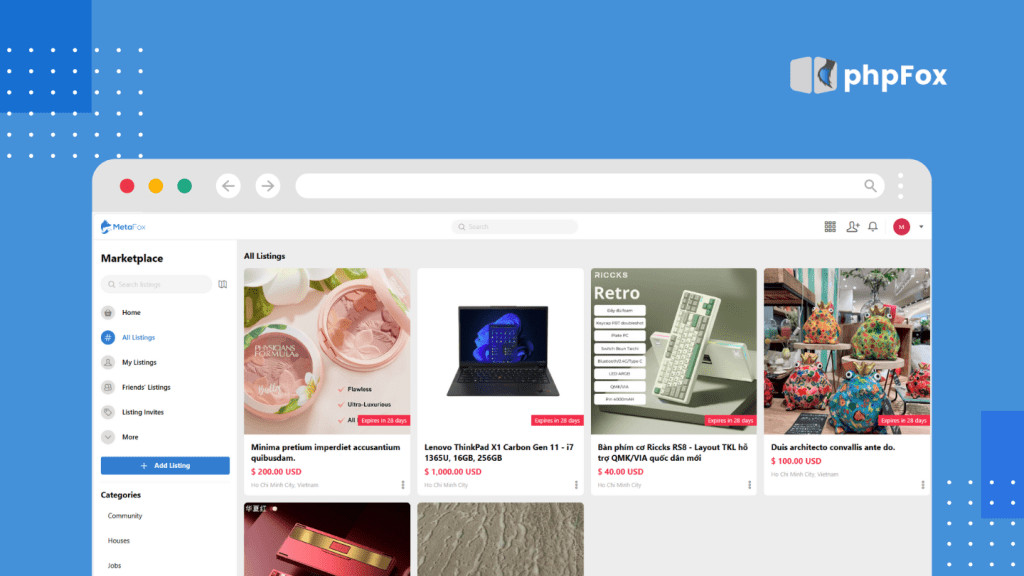
phpFox lets you create a social-driven marketplace, where you can sell products, engage with customers, and grow a brand—all in one platform! 
4. Create & Sell Digital Products 
Selling digital products is one of the most profitable and scalable ways to make money online. Create once, sell indefinitely—no inventory, no shipping, and no production costs. It’s a low-risk, high-reward business model that lets you generate passive income while focusing on what you love.
That said, success doesn’t happen overnight. The real investment is in your knowledge and creativity. You’ll need to research, refine, and market your product effectively. But once you’ve built a strong digital asset, the earning potential is limitless!
 E-books & Guides – Share your expertise in a niche you know well. Whether it’s a fitness guide, business strategy, or self-help book, platforms like Amazon KDP, Gumroad, or Payhip make it easy to sell.
E-books & Guides – Share your expertise in a niche you know well. Whether it’s a fitness guide, business strategy, or self-help book, platforms like Amazon KDP, Gumroad, or Payhip make it easy to sell.
 Stock Photos & Videos – If you’re a photographer or videographer, sell your work on Shutterstock, Adobe Stock, or Pexels. High-quality visuals are in demand for marketing, websites, and social media.
Stock Photos & Videos – If you’re a photographer or videographer, sell your work on Shutterstock, Adobe Stock, or Pexels. High-quality visuals are in demand for marketing, websites, and social media.
 Website Themes & Templates – Web designers and developers can make passive income by selling themes for WordPress (ThemeForest), Shopify.
Website Themes & Templates – Web designers and developers can make passive income by selling themes for WordPress (ThemeForest), Shopify.
 Notion Planners, Spreadsheets & Productivity Tools – People love ready-made budget planners, business trackers, and content calendars. Platforms like Etsy, and Gumroad let you sell these tools to a global audience.
Notion Planners, Spreadsheets & Productivity Tools – People love ready-made budget planners, business trackers, and content calendars. Platforms like Etsy, and Gumroad let you sell these tools to a global audience.
Getting Started
 Potential Earning: Earnings vary depending on demand, marketing, and pricing. A well-marketed e-book can make anywhere from $500 to $5,000+ per month, while successful digital planners or templates can bring in six figures annually.
Potential Earning: Earnings vary depending on demand, marketing, and pricing. A well-marketed e-book can make anywhere from $500 to $5,000+ per month, while successful digital planners or templates can bring in six figures annually.
 Skills Needed: Basic design, writing, or niche expertise. Tools like Canva, Figma, WordPress, and Google Sheets can help beginners create high-quality digital products.
Skills Needed: Basic design, writing, or niche expertise. Tools like Canva, Figma, WordPress, and Google Sheets can help beginners create high-quality digital products.
 Time Commitment: Some digital products can be created in a few hours, while larger projects (like courses or books) may take weeks. The key is to build once and keep selling indefinitely.
Time Commitment: Some digital products can be created in a few hours, while larger projects (like courses or books) may take weeks. The key is to build once and keep selling indefinitely.
 Pro Tip: Focus on solving a specific problem for your audience. The more useful your product, the higher the chances of consistent sales!
Pro Tip: Focus on solving a specific problem for your audience. The more useful your product, the higher the chances of consistent sales! 
5. Launch a YouTube Channel or TikTok Account 
Video content is one of the most powerful ways to build an audience and generate income online. With both short-form (TikTok, YouTube Shorts, Instagram Reels) and long-form (YouTube, Facebook Watch) videos booming, there are endless opportunities to monetize your content.
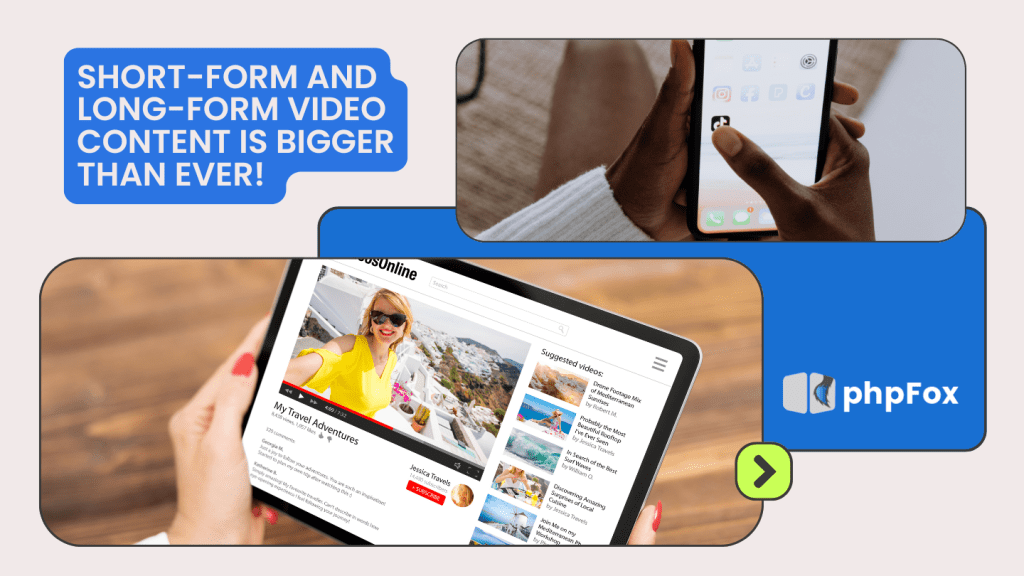
How to Make Money with Video Content?
 YouTube Ad Revenue – Once you hit 1,000 subscribers and 4,000 watch hours, you can monetize through YouTube’s Partner Program.
YouTube Ad Revenue – Once you hit 1,000 subscribers and 4,000 watch hours, you can monetize through YouTube’s Partner Program.
 Brand Sponsorships & Partnerships – Companies pay influencers to review, showcase, or promote their products in videos. Even small creators can land sponsorships by focusing on a specific niche.
Brand Sponsorships & Partnerships – Companies pay influencers to review, showcase, or promote their products in videos. Even small creators can land sponsorships by focusing on a specific niche.
 Affiliate Marketing – Earn commissions by promoting products through affiliate links in your video descriptions. Great for tech, beauty, fitness, and finance content.
Affiliate Marketing – Earn commissions by promoting products through affiliate links in your video descriptions. Great for tech, beauty, fitness, and finance content.
 Exclusive Paid Content – Offer behind-the-scenes videos, tutorials, or premium content through Patreon, YouTube Memberships, or Buy Me a Coffee.
Exclusive Paid Content – Offer behind-the-scenes videos, tutorials, or premium content through Patreon, YouTube Memberships, or Buy Me a Coffee.
 Selling Your Own Products – Many creators use their platforms to sell digital products, courses, or merch (e.g., Notion templates, e-books, presets, coaching sessions). (Tip: Use your videos to showcase the value of your products!)
Selling Your Own Products – Many creators use their platforms to sell digital products, courses, or merch (e.g., Notion templates, e-books, presets, coaching sessions). (Tip: Use your videos to showcase the value of your products!)
How to Grow Your Channel Faster?
 Find a Profitable Niche – The more focused your content, the easier it is to attract an engaged audience. Popular niches include:
Find a Profitable Niche – The more focused your content, the easier it is to attract an engaged audience. Popular niches include: Tech Reviews – Unboxings, gadget comparisons, software tutorials
Tech Reviews – Unboxings, gadget comparisons, software tutorials Personal Finance – Investing tips, side hustle ideas, saving strategies
Personal Finance – Investing tips, side hustle ideas, saving strategies Health & Fitness – Workouts, meal plans, wellness hacks
Health & Fitness – Workouts, meal plans, wellness hacks Self-Improvement – Productivity tips, motivation, skill-building
Self-Improvement – Productivity tips, motivation, skill-building Education & Tutorials – Software guides, business strategies, online courses
Education & Tutorials – Software guides, business strategies, online courses
How Much Can You Earn?
 YouTube Ads: $3–$10 per 1,000 views (varies by niche)
YouTube Ads: $3–$10 per 1,000 views (varies by niche) Brand Sponsorships: $100–$10,000+ per deal (based on audience size & engagement)
Brand Sponsorships: $100–$10,000+ per deal (based on audience size & engagement) Affiliate Marketing: $500–$10,000+ per month (if done strategically)
Affiliate Marketing: $500–$10,000+ per month (if done strategically) Memberships & Patreon: $5–$50 per subscriber/month
Memberships & Patreon: $5–$50 per subscriber/month
 Pro Tip: Find a niche you love (tech, lifestyle, finance) and stay consistent!
Pro Tip: Find a niche you love (tech, lifestyle, finance) and stay consistent!
6. Offer Freelance Services 
Freelancing is one of the quickest ways to earn online. Businesses are constantly seeking talented professionals in everything from writing and graphic design to programming, video editing, and social media marketing. Turn your expertise into income – the opportunities are out there!
Where to Find Clients?
 Upwork – Best for long-term contracts and recurring projects. (Tip: Optimize your profile with keywords and a compelling intro to attract clients!)
Upwork – Best for long-term contracts and recurring projects. (Tip: Optimize your profile with keywords and a compelling intro to attract clients!) Fiverr – Great for offering specialized services in packaged deals. (Tip: Start with competitive pricing and gather strong reviews to rank higher!)
Fiverr – Great for offering specialized services in packaged deals. (Tip: Start with competitive pricing and gather strong reviews to rank higher!) Toptal – Ideal for elite freelancers in tech, finance, and design. (Tip: Rigorous screening process, but higher earnings!)
Toptal – Ideal for elite freelancers in tech, finance, and design. (Tip: Rigorous screening process, but higher earnings!) LinkedIn & Direct Outreach – Many freelancers land high-paying gigs by reaching out directly to startups, agencies, and businesses in need of their skills. (Tip: Create content showcasing your expertise to attract inbound leads!)
LinkedIn & Direct Outreach – Many freelancers land high-paying gigs by reaching out directly to startups, agencies, and businesses in need of their skills. (Tip: Create content showcasing your expertise to attract inbound leads!)
How to Succeed as a Freelancer?
 Build a Strong Portfolio – Even if you’re new, create sample projects to showcase your skills. Platforms like Behance (for designers) or Medium (for writers) help display your work professionally.
Build a Strong Portfolio – Even if you’re new, create sample projects to showcase your skills. Platforms like Behance (for designers) or Medium (for writers) help display your work professionally.
 Specialize for Higher Pay – Niching down (e.g., SaaS content writing, AI-driven UX design, or Shopify development) helps you stand out and charge premium rates.
Specialize for Higher Pay – Niching down (e.g., SaaS content writing, AI-driven UX design, or Shopify development) helps you stand out and charge premium rates.
 Set Competitive Pricing – Research market rates, but don’t underprice yourself. Start with competitive rates and increase as you gain experience and testimonials.
Set Competitive Pricing – Research market rates, but don’t underprice yourself. Start with competitive rates and increase as you gain experience and testimonials.
 Network & Market Yourself – Join industry groups, post valuable content on LinkedIn, and use Twitter/X and Reddit to connect with potential clients.
Network & Market Yourself – Join industry groups, post valuable content on LinkedIn, and use Twitter/X and Reddit to connect with potential clients.
How Much Can You Earn?
 Beginner freelancers: $15–$40/hr (or $100–$500 per project)
Beginner freelancers: $15–$40/hr (or $100–$500 per project)
 Experienced freelancers: $50–$150/hr (or $1,000+ per project)
Experienced freelancers: $50–$150/hr (or $1,000+ per project)
 High-end specialists (e.g., AI developers, SEO consultants, UX strategists): $200–$500/hr
High-end specialists (e.g., AI developers, SEO consultants, UX strategists): $200–$500/hr
 Pro Tip: The key to long-term success is delivering exceptional work and building relationships with clients for repeat business!
Pro Tip: The key to long-term success is delivering exceptional work and building relationships with clients for repeat business!
7. Teach or Coach Online 
In the digital age, knowledge is one of the most profitable assets. Whether you’re an expert in business, tech, fitness, personal development, or any niche skill, people are willing to pay for high-quality guidance. Online teaching and coaching offer flexible income opportunities with scalability—meaning you can teach once and earn multiple times!

How to Monetize Your Knowledge?
 Sell Online Courses – Platforms like Udemy, Teachable, and Kajabi allow you to create and sell pre-recorded courses. Courses on in-demand skills (e.g., coding, marketing, language learning, investing) can generate passive income for years.
Sell Online Courses – Platforms like Udemy, Teachable, and Kajabi allow you to create and sell pre-recorded courses. Courses on in-demand skills (e.g., coding, marketing, language learning, investing) can generate passive income for years.
 Host Live Workshops & Webinars – People are willing to pay for interactive learning experiences. Platforms like Zoom, Google Meet, and WebinarJam make it easy to conduct live Q&A sessions, masterclasses, and virtual training programs.
Host Live Workshops & Webinars – People are willing to pay for interactive learning experiences. Platforms like Zoom, Google Meet, and WebinarJam make it easy to conduct live Q&A sessions, masterclasses, and virtual training programs.
 Offer 1-on-1 Coaching or Consulting – If you specialize in career coaching, fitness training, business consulting, or mindset coaching, personalized guidance can be highly profitable. Set up hourly or package-based sessions on platforms like Clarity.fm, Coach.me, or directly through your website.
Offer 1-on-1 Coaching or Consulting – If you specialize in career coaching, fitness training, business consulting, or mindset coaching, personalized guidance can be highly profitable. Set up hourly or package-based sessions on platforms like Clarity.fm, Coach.me, or directly through your website.
 Build a Subscription-Based Learning Community – Create an exclusive membership where users pay monthly fees for access to premium content, group coaching, and expert Q&As. Platforms like phpFox, Patreon, or Mighty Networks work well for this.
Build a Subscription-Based Learning Community – Create an exclusive membership where users pay monthly fees for access to premium content, group coaching, and expert Q&As. Platforms like phpFox, Patreon, or Mighty Networks work well for this.
How to Stand Out as an Online Coach or Educator?
 Find Your Niche & Target Audience – Are you helping entrepreneurs grow their businesses, guiding people toward healthier lifestyles, or teaching professionals new skills? The clearer your niche, the easier it is to attract the right audience.
Find Your Niche & Target Audience – Are you helping entrepreneurs grow their businesses, guiding people toward healthier lifestyles, or teaching professionals new skills? The clearer your niche, the easier it is to attract the right audience.
 Build Your Authority – Share free valuable content on social media, YouTube, or a blog to establish credibility before selling premium courses or coaching.
Build Your Authority – Share free valuable content on social media, YouTube, or a blog to establish credibility before selling premium courses or coaching.
 Create a High-Quality Learning Experience – Use engaging visuals, real-world examples, and structured learning paths to keep students engaged and coming back for more.
Create a High-Quality Learning Experience – Use engaging visuals, real-world examples, and structured learning paths to keep students engaged and coming back for more.
 Leverage Automation for Passive Income – Record courses and set up automated email sequences so you can earn money while you sleep!
Leverage Automation for Passive Income – Record courses and set up automated email sequences so you can earn money while you sleep!
How Much Can You Earn?
 Selling Courses: $10–$500+ per student
Selling Courses: $10–$500+ per student Live Workshops & Webinars: $50–$1,000+ per session
Live Workshops & Webinars: $50–$1,000+ per session 1-on-1 Coaching: $100–$500+ per hour
1-on-1 Coaching: $100–$500+ per hour Membership Communities: $10–$100+ per subscriber/month
Membership Communities: $10–$100+ per subscriber/month
 Pro Tip: Use your phpFox-powered website to build a branded coaching platform with exclusive content, membership tiers, and community interaction—giving you complete control over pricing and audience engagement!
Pro Tip: Use your phpFox-powered website to build a branded coaching platform with exclusive content, membership tiers, and community interaction—giving you complete control over pricing and audience engagement!
8. Earn Money Through Affiliate Marketing 
Affiliate marketing is one of the most scalable and low-risk ways to earn online. Instead of creating your own product, you simply promote existing products or services and earn a commission for every sale made through your unique affiliate link. Many top bloggers, YouTubers, and influencers generate passive income this way!
How to Succeed in Affiliate Marketing?
 Choose a Profitable Niche – Focus on niches with high demand and strong commission rates such as tech, health & wellness, finance, and software. The more valuable the product, the higher the commission potential.
Choose a Profitable Niche – Focus on niches with high demand and strong commission rates such as tech, health & wellness, finance, and software. The more valuable the product, the higher the commission potential.
 Join High-Paying Affiliate Programs – Not all programs pay equally! Sign up for reputable programs with generous commissions, such as Amazon Associates which is great for physical product. If you’re looking for higher commissions, consider software and SaaS programs like phpFox Affiliate Program – Earn by promoting the leading social network platform builder to businesses and communities! (Perfect for tech and SaaS bloggers!)
Join High-Paying Affiliate Programs – Not all programs pay equally! Sign up for reputable programs with generous commissions, such as Amazon Associates which is great for physical product. If you’re looking for higher commissions, consider software and SaaS programs like phpFox Affiliate Program – Earn by promoting the leading social network platform builder to businesses and communities! (Perfect for tech and SaaS bloggers!)
 Create High-Value Content – To drive affiliate sales, your content must be helpful and engaging. Here are some effective strategies:
Create High-Value Content – To drive affiliate sales, your content must be helpful and engaging. Here are some effective strategies:
- Write Blogs & Reviews – Compare products, list pros & cons, and share personal experiences.
- Create YouTube Videos – Tutorials, unboxings, and honest reviews convert well.
- Post on Social Media – Share insights, tips, and recommendations with affiliate links.
- Build a Resource Page – Have a dedicated section on your website with recommended tools & services.
 Be Honest & Build Trust – Your audience can tell when you’re just pushing sales. Only promote products you genuinely believe in and provide real value in your recommendations.
Be Honest & Build Trust – Your audience can tell when you’re just pushing sales. Only promote products you genuinely believe in and provide real value in your recommendations.
Final Thoughts 
The future of work is online, and the opportunities are endless. Whether you’re passionate about building communities, creating amazing content, or selling products you love, there’s a place for you in the digital economy. Explore the possibilities and get started with phpFox today!
Forum Community vs. Help Desk: Why successful SaaS Businesses Need Both 3 Feb 1:56 AM (2 months ago)
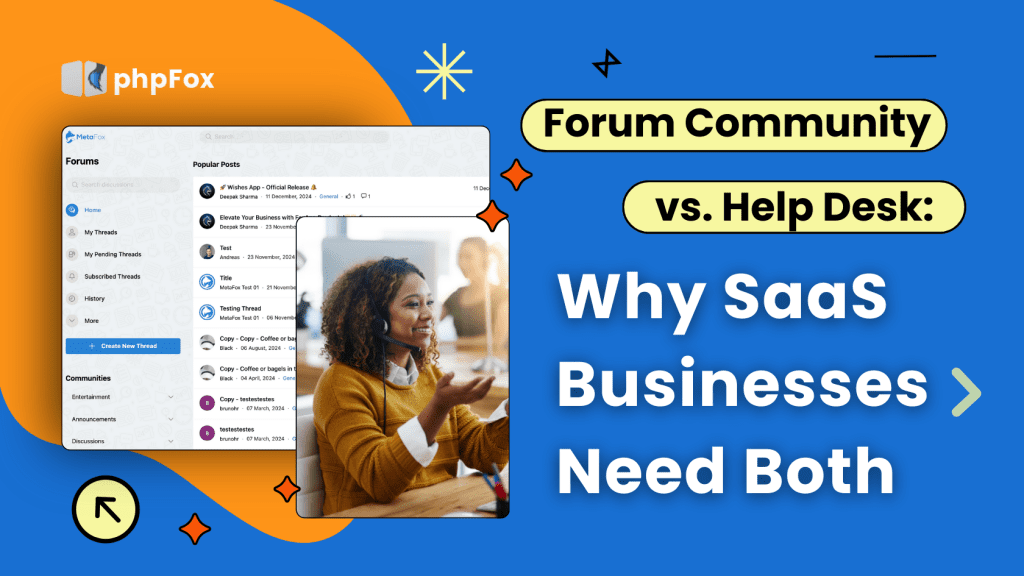
For many SaaS businesses, providing excellent customer support is crucial for user satisfaction and retention. Tools like Intercom and Zendesk work well for answering direct inquiries, but what about repeat questions that other users could benefit from? What about feature requests and user-driven discussions? That’s where a forum community comes in.
In this article, we’ll explore why a forum community and a help desk should work together, the key differences between them, and how to choose the ideal forum community for your SaaS business.
Table of Contents
Forum Community vs. Help Desk: Understanding the Difference
Both a help desk and a forum community are essential for SaaS businesses, but they serve different purposes. While a help desk focuses on direct, one-on-one support, a forum community scales your support efforts by fostering knowledge-sharing and user-driven engagement.

Help Desk: Fast, Direct, But Limited
A help desk solution (like Intercom or Zendesk) plays a crucial role in delivering personalized and real-time assistance. It enables businesses to:
 Provide instant support via live chat, email, or tickets, ensuring quick issue resolution.
Provide instant support via live chat, email, or tickets, ensuring quick issue resolution. Offer personalized responses, tailoring solutions to each user’s specific needs.
Offer personalized responses, tailoring solutions to each user’s specific needs. Handle private or urgent matters, such as billing issues or security concerns, in a secure, closed environment.
Handle private or urgent matters, such as billing issues or security concerns, in a secure, closed environment.
However, while a help desk is great for direct support, it has several limitations:
 Repetitive queries: Many users ask the same questions, leading to duplicate support tickets and increased workload for your team.
Repetitive queries: Many users ask the same questions, leading to duplicate support tickets and increased workload for your team. No community engagement: Customers only interact with support agents, missing out on the collective knowledge of other users.
No community engagement: Customers only interact with support agents, missing out on the collective knowledge of other users. Feature request black hole: Suggestions and feedback often get buried in private tickets, making it harder to gauge demand for new features.
Feature request black hole: Suggestions and feedback often get buried in private tickets, making it harder to gauge demand for new features.
Forum Community: Scalable, Engaging, and Insightful
A forum community, on the other hand, acts as a dynamic self-service knowledge base while fostering engagement between users. Here’s how it benefits SaaS businesses:
 Scalability & Efficiency – Instead of repeatedly answering the same questions, a forum allows users to search past discussions and find solutions instantly. This reduces your support team’s workload.
Scalability & Efficiency – Instead of repeatedly answering the same questions, a forum allows users to search past discussions and find solutions instantly. This reduces your support team’s workload.
 Peer-to-Peer Support – Customers can help each other by sharing real-world solutions, tips, and best practices. This not only builds engagement but also creates a more vibrant and collaborative user base.
Peer-to-Peer Support – Customers can help each other by sharing real-world solutions, tips, and best practices. This not only builds engagement but also creates a more vibrant and collaborative user base.
 Feature Requests & Voting – Unlike private tickets that only your team sees, forums allow customers to submit feature requests publicly, vote on them, and discuss improvements. This helps you prioritize enhancements based on real demand.
Feature Requests & Voting – Unlike private tickets that only your team sees, forums allow customers to submit feature requests publicly, vote on them, and discuss improvements. This helps you prioritize enhancements based on real demand.
 SEO & Content Value – Every discussion and solved issue in a forum becomes a searchable resource, improving your product’s visibility and reducing support requests over time.
SEO & Content Value – Every discussion and solved issue in a forum becomes a searchable resource, improving your product’s visibility and reducing support requests over time.
Why SaaS businesses need both?
A help desk alone can’t meet the evolving needs of SaaS businesses. While it excels at one-on-one support, it lacks the scalability, engagement, and long-term value that a forum community brings. Here’s why integrating both can transform customer support and product growth:
1. Reduce Support Costs & Ticket Volume
When users can find answers in a forum, they don’t need to submit repetitive tickets. This lowers support costs, frees up your team for complex issues, and improves response times where it truly matters. Instead of solving the same problem over and over, your support team can focus on strategic improvements.
2. Enhance User Experience & Self-Service
Today’s customers expect instant solutions—and most prefer self-service before reaching out for help. A forum acts as a living knowledge base powered by real users, offering insights that a help desk alone can’t provide. This fosters a frictionless experience, improving satisfaction and retention.
3. Turn Customers into Brand Advocates
A forum creates a space where power users and loyal customers can share their expertise, answer questions, and champion your product. This peer-to-peer support not only builds a stronger user community but also transforms satisfied customers into brand ambassadors.
4. Collect Valuable Feedback & Feature Requests
Help desk tickets are isolated, making it difficult to identify trends in customer requests. A forum enables users to suggest and vote on features, giving your product team clear insights into customer needs. This makes prioritizing updates and improvements more data-driven and impactful.
5. SEO & Organic Growth
A help desk is a closed system, but a forum creates searchable, user-generated content that continues to drive traffic over time. Each discussion adds fresh content that search engines index, improving SEO rankings and attracting new users organically.
Integrating a forum alongside a help desk allows SaaS companies to combine efficiency with engagement—offering structured, real-time support while leveraging community-driven insights to enhance their product and customer experience.
Finding the Right Community Platform for Your SaaS
Building a thriving SaaS community starts with choosing the right platform. The wrong choice can limit engagement, and fail to align with your business goals.
Your ideal community platform should: Align with your company’s goals
Align with your company’s goals Be easily accessible to your team and customers
Be easily accessible to your team and customers Support meaningful discussions and engagement
Support meaningful discussions and engagement
Here are some common platforms SaaS companies choose to build their communities
 Social media platforms like Facebook (2.9B MAU), LinkedIn (424M MAU), and Reddit (430M MAU) offer large audiences but limited control over branding, data, and moderation.
Social media platforms like Facebook (2.9B MAU), LinkedIn (424M MAU), and Reddit (430M MAU) offer large audiences but limited control over branding, data, and moderation. Messaging platforms like Discord and Slack.
Messaging platforms like Discord and Slack.  Dedicated community platforms – like phpFox
Dedicated community platforms – like phpFox
While platforms like Reddit and Discord offer discussion spaces, they may not be suitable for enterprise users due to accessibility restrictions. A dedicated forum community (such as phpFox) provides full control, customization, and security to match your brand and audience needs.

Key Features to Look for in a Forum Platform
The ideal platform should not only facilitate discussions but also integrate seamlessly with your existing tools. Here’s what to look for:
- Seamless integration with your existing help desk.
- Custom branding to match your SaaS identity.
- Feature request management with voting capabilities.
- Private & public discussions for flexibility.
- Robust moderation tools to maintain quality discussions.
Why phpFox Stands Out
Unlike social or messaging platforms, phpFox is built for long-term community growth. You get: Full ownership & branding – No third-party restrictions or data concerns.
Full ownership & branding – No third-party restrictions or data concerns. Engagement-driven features – Forums, groups, polls, reactions, and more to foster discussions.
Engagement-driven features – Forums, groups, polls, reactions, and more to foster discussions. Scalability & integrations – Expand your community with custom features and seamless SaaS integration.
Scalability & integrations – Expand your community with custom features and seamless SaaS integration.
Time to build an online community for your SaaS company
A help desk and a forum aren’t competitors—they’re partners. While a help desk ensures fast, direct support, a forum fosters engagement, knowledge-sharing, and long-term scalability. For SaaS businesses looking to improve support efficiency while growing an active community, combining both is the ultimate win-win.
Ready to build a thriving community for your SaaS product?  Get started with phpFox today and build a thriving forum community for your SaaS business!
Get started with phpFox today and build a thriving forum community for your SaaS business!